Summer 2024 Admissions Open Now. Sign up for upcoming live information sessions here (featuring former and current Admission Officers at Havard and UPenn).

Discourse, debate, and analysis
Cambridge re:think essay competition 2024.
Competition Opens: 15th January, 2024
Essay Submission Deadline: 10th May, 2024 Result Announcement: 20th June, 2024 Award Ceremony and Dinner at the University of Cambridge: 30th July, 2024
We welcome talented high school students from diverse educational settings worldwide to contribute their unique perspectives to the competition.
Entry to the competition is free.
About the Competition
The spirit of the Re:think essay competition is to encourage critical thinking and exploration of a wide range of thought-provoking and often controversial topics. The competition covers a diverse array of subjects, from historical and present issues to speculative future scenarios. Participants are invited to engage deeply with these topics, critically analysing their various facets and implications. It promotes intellectual exploration and encourages participants to challenge established norms and beliefs, presenting opportunities to envision alternative futures, consider the consequences of new technologies, and reevaluate longstanding traditions.
Ultimately, our aim is to create a platform for students and scholars to share their perspectives on pressing issues of the past and future, with the hope of broadening our collective understanding and generating innovative solutions to contemporary challenges. This year’s competition aims to underscore the importance of discourse, debate, and critical analysis in addressing complex societal issues in nine areas, including:
Religion and Politics
Political science and law, linguistics, environment, sociology and philosophy, business and investment, public health and sustainability, biotechonology.
Artificial Intelligence
Neuroengineering
2024 essay prompts.
This year, the essay prompts are contributed by distinguished professors from Harvard, Brown, UC Berkeley, Cambridge, Oxford, and MIT.
Essay Guidelines and Judging Criteria
Review general guidelines, format guidelines, eligibility, judging criteria.
Awards and Award Ceremony
Award winners will be invited to attend the Award Ceremony and Dinner hosted at the King’s College, University of Cambridge. The Dinner is free of charge for select award recipients.
Registration and Submission
Register a participant account today and submit your essay before the deadline.
Advisory Committee and Judging Panel
The Cambridge Re:think Essay Competition is guided by an esteemed Advisory Committee comprising distinguished academics and experts from elite universities worldwide. These committee members, drawn from prestigious institutions, such as Harvard, Cambridge, Oxford, and MIT, bring diverse expertise in various disciplines.
They play a pivotal role in shaping the competition, contributing their insights to curate the themes and framework. Their collective knowledge and scholarly guidance ensure the competition’s relevance, academic rigour, and intellectual depth, setting the stage for aspiring minds to engage with thought-provoking topics and ideas.
We are honoured to invite the following distinguished professors to contribute to this year’s competition.
The judging panel of the competition comprises leading researchers and professors from Harvard, MIT, Stanford, Cambridge, and Oxford, engaging in a strictly double blind review process.

Keynote Speeches by 10 Nobel Laureates
We are beyond excited to announce that multiple Nobel laureates have confirmed to attend and speak at this year’s ceremony on 30th July, 2024 .
They will each be delivering a keynote speech to the attendees. Some of them distinguished speakers will speak virtually, while others will attend and present in person and attend the Reception at Cambridge.

Why has religion remained a force in a secular world?
Professor Commentary:
Arguably, the developed world has become more secular in the last century or so. The influence of Christianity, e.g. has diminished and people’s life worlds are less shaped by faith and allegiance to Churches. Conversely, arguments have persisted that hold that we live in a post-secular world. After all, religion – be it in terms of faith, transcendence, or meaning – may be seen as an alternative to a disenchanted world ruled by entirely profane criteria such as economic rationality, progressivism, or science. Is the revival of religion a pale reminder of a by-gone past or does it provide sources of hope for the future?
‘Religion in the Public Sphere’ by Jürgen Habermas (European Journal of Philosophy, 2006)
In this paper, philosopher Jürgen Habermas discusses the limits of church-state separation, emphasizing the significant contribution of religion to public discourse when translated into publicly accessible reasons.
‘Public Religions in the Modern World’ by José Casanova (University Of Chicago Press, 1994)
Sociologist José Casanova explores the global emergence of public religion, analyzing case studies from Catholicism and Protestantism in Spain, Poland, Brazil, and the USA, challenging traditional theories of secularization.
‘The Power of Religion in the Public Sphere’ by Judith Butler, Jürgen Habermas, Charles Taylor, and Cornel West (Edited by Eduardo Mendieta and Jonathan VanAntwerpen, Columbia University Press, 2011)
This collection features dialogues by prominent intellectuals on the role of religion in the public sphere, examining various approaches and their impacts on cultural, social, and political debates.
‘Rethinking Secularism’ by Craig Calhoun, Mark Juergensmeyer, and Jonathan VanAntwerpen (Oxford University Press, 2011)
An interdisciplinary examination of secularism, this book challenges traditional views, highlighting the complex relationship between religion and secularism in contemporary global politics.
‘God is Back: How the Global Rise of Faith is Changing the World’ by John Micklethwait and Adrian Wooldridge (Penguin, 2010)
Micklethwait and Wooldridge argue for the coexistence of religion and modernity, suggesting that religious beliefs can contribute to a more open, tolerant, and peaceful modern world.
‘Multiculturalism’ by Tariq Modood (Polity Press, 2013)
Sociologist Tariq Modood emphasizes the importance of multiculturalism in integrating diverse identities, particularly in post-immigration contexts, and its role in shaping democratic citizenship.
‘God’s Agents: Biblical Publicity in Contemporary England’ by Matthew Engelke (University of California Press, 2013)
In this ethnographic study, Matthew Engelke explores how a group in England seeks to expand the role of religion in the public sphere, challenging perceptions of religion in post-secular England.

Gene therapy is a medical approach that treats or prevents disease by correcting the underlying genetic problem. Is gene therapy better than traditional medicines? What are the pros and cons of using gene therapy as a medicine? Is gene therapy justifiable?
Especially after Covid-19 mRNA vaccines, gene therapy is getting more and more interesting approach to cure. That’s why that could be interesting to think about. I believe that students will enjoy and learn a lot while they are investigating this topic.

The Hall at King’s College, Cambridge
The Hall was designed by William Wilkins in the 1820s and is considered one of the most magnificent halls of its era. The first High Table dinner in the Hall was held in February 1828, and ever since then, the splendid Hall has been where members of the college eat and where formal dinners have been held for centuries.
The Award Ceremony and Dinner will be held in the Hall in the evening of 30th July, 2024.

Stretching out down to the River Cam, the Back Lawn has one of the most iconic backdrop of King’s College Chapel.
The early evening reception will be hosted on the Back Lawn with the iconic Chapel in the background (weather permitting).

King’s College Chapel
With construction started in 1446 by Henry VI and took over a century to build, King’s College Chapel is one of the most iconic buildings in the world, and is a splendid example of late Gothic architecture.
Attendees are also granted complimentary access to the King’s College Chapel before and during the event.
Confirmed Nobel Laureates

Dr Thomas R. Cech
The nobel prize in chemistry 1989 , for the discovery of catalytic properties of rna.
Thomas Robert Cech is an American chemist who shared the 1989 Nobel Prize in Chemistry with Sidney Altman, for their discovery of the catalytic properties of RNA. Cech discovered that RNA could itself cut strands of RNA, suggesting that life might have started as RNA. He found that RNA can not only transmit instructions, but also that it can speed up the necessary reactions.
He also studied telomeres, and his lab discovered an enzyme, TERT (telomerase reverse transcriptase), which is part of the process of restoring telomeres after they are shortened during cell division.
As president of Howard Hughes Medical Institute, he promoted science education, and he teaches an undergraduate chemistry course at the University of Colorado

Sir Richard J. Roberts
The nobel prize in medicine 1993 .
F or the discovery of split genes
During 1969–1972, Sir Richard J. Roberts did postdoctoral research at Harvard University before moving to Cold Spring Harbor Laboratory, where he was hired by James Dewey Watson, a co-discoverer of the structure of DNA and a fellow Nobel laureate. In this period he also visited the MRC Laboratory of Molecular Biology for the first time, working alongside Fred Sanger. In 1977, he published his discovery of RNA splicing. In 1992, he moved to New England Biolabs. The following year, he shared a Nobel Prize with his former colleague at Cold Spring Harbor Phillip Allen Sharp.
His discovery of the alternative splicing of genes, in particular, has had a profound impact on the study and applications of molecular biology. The realisation that individual genes could exist as separate, disconnected segments within longer strands of DNA first arose in his 1977 study of adenovirus, one of the viruses responsible for causing the common cold. Robert’s research in this field resulted in a fundamental shift in our understanding of genetics, and has led to the discovery of split genes in higher organisms, including human beings.

Dr Aaron Ciechanover
The nobel prize in chemistry 2004 .
F or the discovery of ubiquitin-mediated protein degradation
Aaron Ciechanover is one of Israel’s first Nobel Laureates in science, earning his Nobel Prize in 2004 for his work in ubiquitination. He is honored for playing a central role in the history of Israel and in the history of the Technion – Israel Institute of Technology.
Dr Ciechanover is currently a Technion Distinguished Research Professor in the Ruth and Bruce Rappaport Faculty of Medicine and Research Institute at the Technion. He is a member of the Israel Academy of Sciences and Humanities, the Pontifical Academy of Sciences, the National Academy of Sciences of Ukraine, the Russian Academy of Sciences and is a foreign associate of the United States National Academy of Sciences. In 2008, he was a visiting Distinguished Chair Professor at NCKU, Taiwan. As part of Shenzhen’s 13th Five-Year Plan funding research in emerging technologies and opening “Nobel laureate research labs”, in 2018 he opened the Ciechanover Institute of Precision and Regenerative Medicine at the Chinese University of Hong Kong, Shenzhen campus.

Dr Robert Lefkowitz
The nobel prize in chemistry 2012 .
F or the discovery of G protein-coupled receptors
Robert Joseph Lefkowitz is an American physician (internist and cardiologist) and biochemist. He is best known for his discoveries that reveal the inner workings of an important family G protein-coupled receptors, for which he was awarded the 2012 Nobel Prize for Chemistry with Brian Kobilka. He is currently an Investigator with the Howard Hughes Medical Institute as well as a James B. Duke Professor of Medicine and Professor of Biochemistry and Chemistry at Duke University.
Dr Lefkowitz made a remarkable contribution in the mid-1980s when he and his colleagues cloned the gene first for the β-adrenergic receptor, and then rapidly thereafter, for a total of 8 adrenergic receptors (receptors for adrenaline and noradrenaline). This led to the seminal discovery that all GPCRs (which include the β-adrenergic receptor) have a very similar molecular structure. The structure is defined by an amino acid sequence which weaves its way back and forth across the plasma membrane seven times. Today we know that about 1,000 receptors in the human body belong to this same family. The importance of this is that all of these receptors use the same basic mechanisms so that pharmaceutical researchers now understand how to effectively target the largest receptor family in the human body. Today, as many as 30 to 50 percent of all prescription drugs are designed to “fit” like keys into the similarly structured locks of Dr Lefkowitz’ receptors—everything from anti-histamines to ulcer drugs to beta blockers that help relieve hypertension, angina and coronary disease.
Dr Lefkowitz is among the most highly cited researchers in the fields of biology, biochemistry, pharmacology, toxicology, and clinical medicine according to Thomson-ISI.

Dr Joachim Frank
The nobel prize in chemistry 2017 .
F or developing cryo-electron microscopy
Joachim Frank is a German-American biophysicist at Columbia University and a Nobel laureate. He is regarded as the founder of single-particle cryo-electron microscopy (cryo-EM), for which he shared the Nobel Prize in Chemistry in 2017 with Jacques Dubochet and Richard Henderson. He also made significant contributions to structure and function of the ribosome from bacteria and eukaryotes.
In 1975, Dr Frank was offered a position of senior research scientist in the Division of Laboratories and Research (now Wadsworth Center), New York State Department of Health,where he started working on single-particle approaches in electron microscopy. In 1985 he was appointed associate and then (1986) full professor at the newly formed Department of Biomedical Sciences of the University at Albany, State University of New York. In 1987 and 1994, he went on sabbaticals in Europe, one to work with Richard Henderson, Laboratory of Molecular Biology Medical Research Council in Cambridge and the other as a Humboldt Research Award winner with Kenneth C. Holmes, Max Planck Institute for Medical Research in Heidelberg. In 1998, Dr Frank was appointed investigator of the Howard Hughes Medical Institute (HHMI). Since 2003 he was also lecturer at Columbia University, and he joined Columbia University in 2008 as professor of Biochemistry and Molecular Biophysics and of biological sciences.

Dr Barry C. Barish
The nobel prize in physics 2017 .
For the decisive contributions to the detection of gravitational waves
Dr Barry Clark Barish is an American experimental physicist and Nobel Laureate. He is a Linde Professor of Physics, emeritus at California Institute of Technology and a leading expert on gravitational waves.
In 2017, Barish was awarded the Nobel Prize in Physics along with Rainer Weiss and Kip Thorne “for decisive contributions to the LIGO detector and the observation of gravitational waves”. He said, “I didn’t know if I would succeed. I was afraid I would fail, but because I tried, I had a breakthrough.”
In 2018, he joined the faculty at University of California, Riverside, becoming the university’s second Nobel Prize winner on the faculty.
In the fall of 2023, he joined Stony Brook University as the inaugural President’s Distinguished Endowed Chair in Physics.
In 2023, Dr Barish was awarded the National Medal of Science by President Biden in a White House ceremony.

Dr Harvey J. Alter
The nobel prize in medicine 2020 .
For the discovery of Hepatitis C virus
Dr Harvey J. Alter is an American medical researcher, virologist, physician and Nobel Prize laureate, who is best known for his work that led to the discovery of the hepatitis C virus. Alter is the former chief of the infectious disease section and the associate director for research of the Department of Transfusion Medicine at the Warren Grant Magnuson Clinical Center in the National Institutes of Health (NIH) in Bethesda, Maryland. In the mid-1970s, Alter and his research team demonstrated that most post-transfusion hepatitis cases were not due to hepatitis A or hepatitis B viruses. Working independently, Alter and Edward Tabor, a scientist at the U.S. Food and Drug Administration, proved through transmission studies in chimpanzees that a new form of hepatitis, initially called “non-A, non-B hepatitis” caused the infections, and that the causative agent was probably a virus. This work eventually led to the discovery of the hepatitis C virus in 1988, for which he shared the Nobel Prize in Physiology or Medicine in 2020 along with Michael Houghton and Charles M. Rice.
Dr Alter has received recognition for the research leading to the discovery of the virus that causes hepatitis C. He was awarded the Distinguished Service Medal, the highest award conferred to civilians in United States government public health service, and the 2000 Albert Lasker Award for Clinical Medical Research.

Dr Ardem Patapoutian
The nobel prize in medicine 2021 .
For discovering how pressure is translated into nerve impulses
Dr Ardem Patapoutian is an Lebanese-American molecular biologist, neuroscientist, and Nobel Prize laureate of Armenian descent. He is known for his work in characterising the PIEZO1, PIEZO2, and TRPM8 receptors that detect pressure, menthol, and temperature. Dr Patapoutian is a neuroscience professor and Howard Hughes Medical Institute investigator at Scripps Research in La Jolla, California. In 2021, he won the Nobel Prize in Physiology or Medicine jointly with David Julius.
Frequently Asked Questions
Why should I participate in the Re:think essay competition?
The Re:think Essay competition is meant to serve as fertile ground for honing writing skills, fostering critical thinking, and refining communication abilities. Winning or participating in reputable contests can lead to recognition, awards, scholarships, or even publication opportunities, elevating your academic profile for college applications and future endeavours. Moreover, these competitions facilitate intellectual growth by encouraging exploration of diverse topics, while also providing networking opportunities and exposure to peers, educators, and professionals. Beyond accolades, they instil confidence, prepare for higher education demands, and often allow you to contribute meaningfully to societal conversations or causes, making an impact with your ideas.
Who is eligible to enter the Re:think essay competition?
As long as you’re currently attending high school, regardless of your location or background, you’re eligible to participate. We welcome students from diverse educational settings worldwide to contribute their unique perspectives to the competition.
Is there any entry fee for the competition?
There is no entry fee for the competition. Waiving the entry fee for our essay competition demonstrates CCIR’s dedication to equity. CCIR believes everyone should have an equal chance to participate and showcase their talents, regardless of financial circumstances. Removing this barrier ensures a diverse pool of participants and emphasises merit and creativity over economic capacity, fostering a fair and inclusive environment for all contributors.
Subscribe for Competition Updates
If you are interested to receive latest information and updates of this year’s competition, please sign up here.

CCIR Academy Admissions Portal
Start your application here.
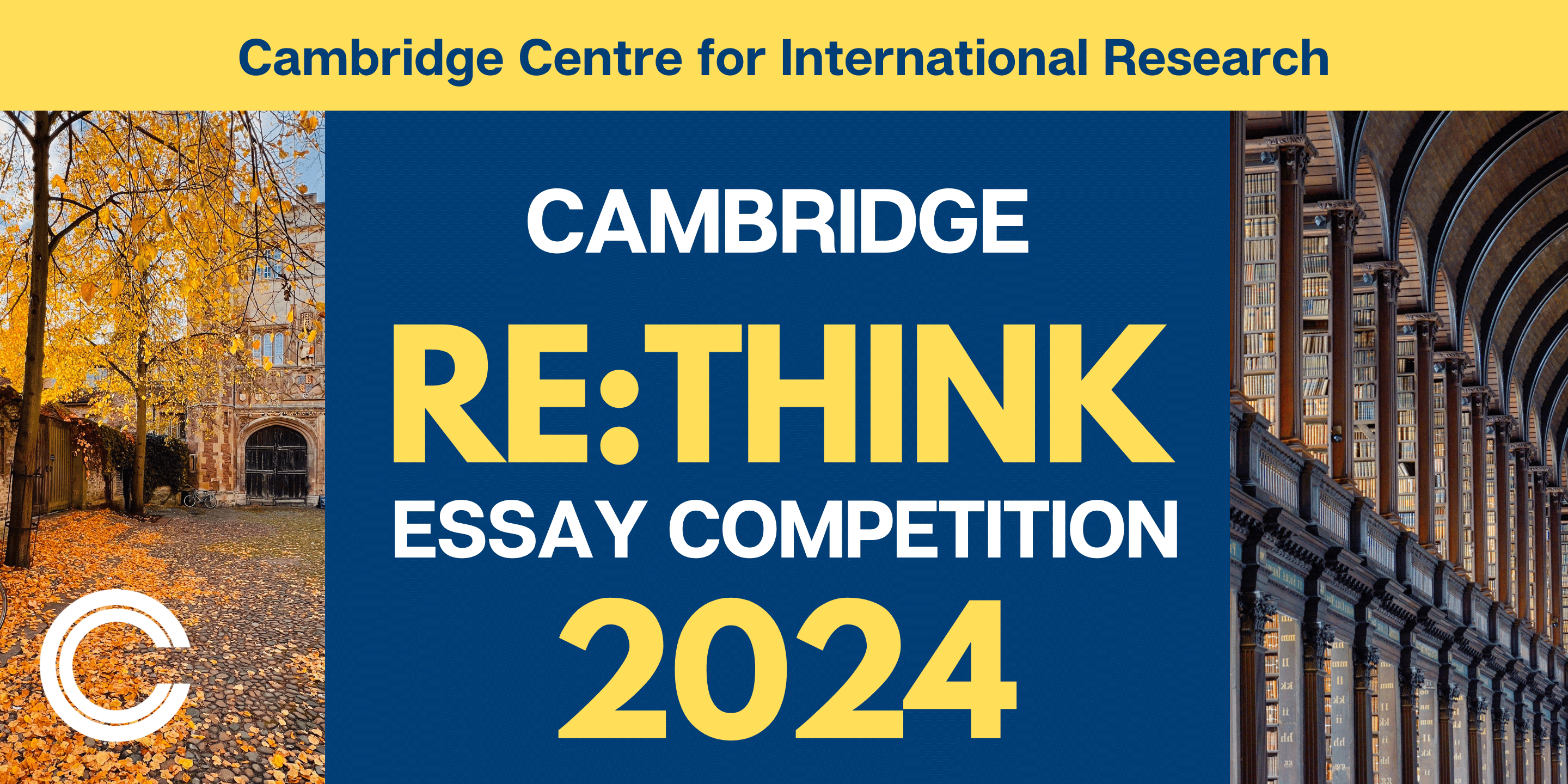
Important Dates & Deadlines
Competition Opens: Jan 15, 2024
Essay Submission Deadline: 10th May, 2024
Result Announcement: 20th June, 2024
Award Ceremony and Dinner* at the University of Cambridge: 30th July, 2024
*Only shortlisted students (awarded Honourable Mention or above) and their companies are invited to the ceremony and dinner.
Read the 2024 Essay Prompts
This year, the essays are contributed by distinguished professors from Harvard, Brown, UC Berkeley, Cambridge, Oxford, and MIT.
The judging panel of the competition comprises leading researchers and professors from Harvard, MIT, Stanford, Cambridge, and Oxford, engaging in a strictly double blind review process.
Awards and Award Ceremony
Award winners will be invited to attend the Award Ceremony and Dinner hosted at the King’s College, University of Cambridge on 30th July, 2024. The Dinner is free of charge for select award recipients.
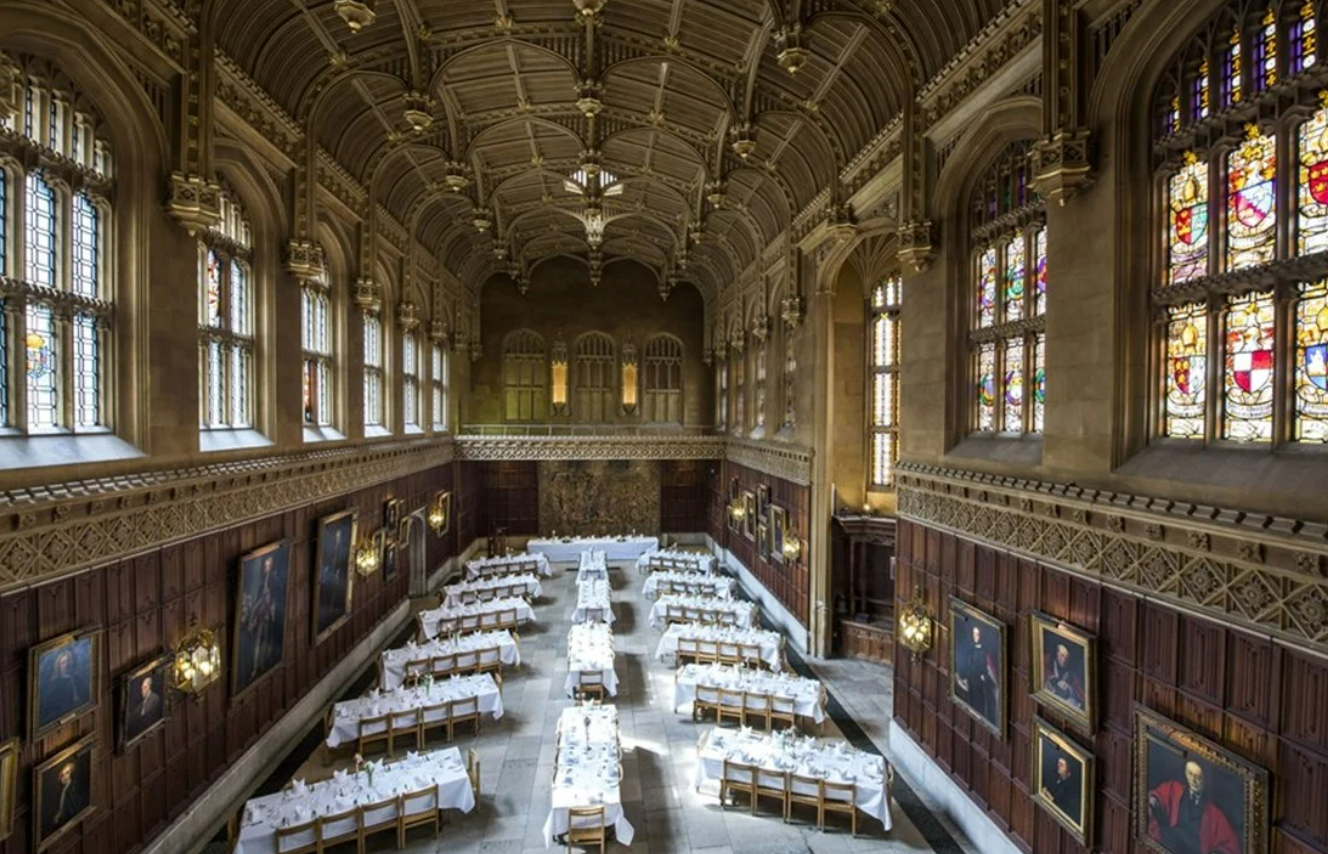
Cambridge Re:think Essay Competition 2024 Submission Portal
Jan 15 2024 12:00 am (gmt), may 10 2024 11:59 pm (gmt).
Cambridge Essay Competitions
Essay competitions are brilliant for a number of reasons!
You can use them to:
The essay competitions usually become open for submissions after the winter holidays. Be sure to check any eligibility criteria, requirements and deadlines. This page will be updated when new competitions are announced, and when deadlines are passed, so check back regularly! All essay competitions and events at Cambridge (both online and in-person) can be found here 🔗 🌟.
Magdalene College Arts and Humanities Essay Competition 2024 🔗 🌟 Any student in their penultimate year at a state school can enter this competition, which will open in early 2024. Last year, there were 12 questions covering a variety of topics within the arms and humanities - you can read the winning entries here 🔗. To register your interest in this competition for 2024, fill in this form 🔗.
Fitzwilliam College Essay Competitions: various subjects 🔗 🌟 Fitzwilliam College runs a variety of competitions in Ancient World and Classics, Archaeology, History, Land Economy, Medieval World, Architecture, and Economics (this last one is for state-school UK students only). All competitions are open to Year 12 students and are designed to encourage students to pursue their interests in subjects they might not be able to study in depth at school. Last year, the deadline for all competition entries was the 1st of March, so make sure to check back in early 2024 for updates.
Newnham College Woolf Essay Prize 🔗 🌟 The Woolf Essay Competition is focussed on women in literature, history, society and culture. There are also competitions for other subjects - more information these will be coming soon. Webinars to help support your entry can be found here 🔗 . The deadline for the Woolf Prize last year was the 14th of July.
Girton College Humanities Writing Competition 🔗 An opportunity for students interested in pursuing any humanities subject to write creatively! Year 12 students may enter with an essay or piece of creative writing using an object from Girton College’s small antiquities museum, the Lawrence Room, as their prompt.
Robinson College Essay Prize: various subjects 🔗 Year 12 students may submit an essay of up to 2,000 words in response to one of the set questions, which cover a wide variety of academic subjects. The prize did not run in 2023, but may in 2024.
Trinity College Essay Prizes 🔗 These competitions give entrants the opportunity to write an essay of up to 2,000 words in response to the set question/(s). Last year there were competitions for English Literature, Launguages, Linguistics, Philosophy, Politics, Law, and History.
Did you spot a typo or formatting issue? Let us know by emailing us at [email protected] .
MAGDALENE COLLEGE
Primary tabs
- View (active tab)
- Latest version
Armstrong Arts and Humanities Essay Competition
The competition is open to students attending state-maintained schools in the UK, and who are in their penultimate year of education (Year 12 in England and Wales, S5 in Scotland, or Year 13 in Northern Ireland).
Essay Questions
The essay questions cover the breadth of arts and humanities subjects offered at undergraduate level at the University of Cambridge.
Questions are often multi-disciplinary, designed to encourage entries to consider the connections between various subjects, and to allow entries to approach the question from varying angles. Effective essays will present a clear argument supported by specific, relevant examples.
1. Are there some fundamental rights which legislation cannot remove?
If you are interested in this question, you may wish to explore Cambridge undergraduate courses in Human, Social, and Political Sciences , and Law .
2. Is translation more like an art or more like a science?
If you are interested in this question, you may wish to explore Cambridge undergraduate courses in Anglo-Saxon, Norse, and Celtic ; Asian and Middle Eastern Studies ; Classics ; Modern and Medieval Languages ; and Theology, Religion, and Philosophy of Religion .
3. “It's all about feeling. If you can play 1,000 notes a minute, and it just goes straight across the board and there’s no feeling, it doesn't mean anything.” – B. B. King (blues guitarist), The Life of Riley (2012 documentary film). Discuss the role of feeling in music-making, and answer the question ‘could a robot be a good guitarist?’
If you are interested in this question, you may wish to explore Cambridge undergraduate courses in Music , and Philosophy .
4. ‘Crime does not exist. Only acts exist, acts are often given different meanings within various social frameworks.’ (Christie, 2004). Do you agree?
5. For studying literature, the selection of a canon should not only be based on quality of the texts but also on equal representation, in terms of age, gender and ethnicity, of its intended readers. Do you agree?
If you are interested in this question, you may wish to explore Cambridge undergraduate courses in Asian and Middle Eastern Studies ; Classics ; Education ; English ; and Modern and Medieval Languages .
6. If aliens existed, would they have a concept of God?
If you are interested in this question, you may wish to explore Cambridge undergraduate courses in Philosophy , and Theology, Religion, and Philosophy of Religion .
7. ‘As one reads history . . . one is absolutely sickened not by the crimes the wicked have committed, but by the punishments the good have inflicted’ (Oscar Wilde, 1891). How should punishments be determined?
If you are interested in this question, you may wish to explore Cambridge undergraduate courses in Education ; History, and Human, Social, and Political Sciences .
8. Does the power of multi-national corporations now exceed that of the nation state?
If you are interested in this question, you may wish to explore Cambridge undergraduate courses in History; Human, Social, and Political Sciences ; and Law .
9. Why do languages change?
If you are interested in this question, you may wish to explore Cambridge undergraduate courses in Anglo-Saxon, Norse, and Celtic ; Asian and Middle Eastern Studies ; Classics ; Linguistics ; Modern and Medieval Languages ; and Theology, Religion, and Philosophy of Religion .
10. "We are bored when we don't know what we are waiting for. That we do know, or think we know, is nearly always the expression of our superficiality or inattention. Boredom is the threshold to great deeds." (Walter Benjamin, The Arcades Project, 105). Write an essay in defence of boredom using this quotation as a starting point.
If you are interested in this question, you may wish to explore Cambridge undergraduate courses in English ; Human, Social, and Political Sciences ; Philosophy ; and Theology, Religion, and Philosophy of Religion .
11. What can the study of sexuality in the ancient world teach us about the formation of the modern self?
If you are interested in this question, you may wish to explore Cambridge undergraduate courses in Archaeology ; Classics ; English ; History ; and Human, Social, and Political Sciences .
12. "A picture is worth a thousand words". What is the place of studying texts in a world that is increasingly dependent on visual communication?
If you are interested in this question, you may wish to explore Cambridge undergraduate courses in Asian and Middle Eastern Studies ; Classics ; English ; History of Art ; Linguistics ; and Modern and Medieval Languages .
The essay questions are available to view in PDF format here:
Submissions should adhere to the word limit of 2,000 words, which does not include footnotes or bibliographies. The word count should be stated at the end of the essay.
All sources should be cited and listed in a bibliography. We understand that entrants may not have prior experience of referencing and would recommend Harvard referencing system website for an explanation of the Harvard referencing system. Entrants are welcome to use alternative reference styles if they prefer.
Entrants should submit one essay only. The submission must be entirely the entrant’s own work, and should not contain any work generated by ChatGPT or other forms of artificial intelligence. The competition judges are mindful of the advancements in generative AI and will disqualify any submissions which demonstrate similarities to responses produced by AI tools. Entries must not be submitted or have been submitted to an exam board as part of any coursework, extended essay, or Extended Project Qualification (EPQ), either in part or in full.
The deadline for submissions is 3 May 2024 at 18:00.
Essays should be submitted by the form at the link below.
First prize: £300 Second prize: £200 Third Prize £100.
Honourable mentions may also be awarded. Prize winners will be invited to visit Magdalene College in Summer 2024.
The webinars below, recorded in 2023, may provide some advice and inspiration for researching, writing, and refining your essay.
If you have any questions regarding the competition, please contact Natalie Thompson, Schools Liaison Officer, by emailing [email protected] .
Essay-writing Webinars
Magdalene College Schools Liaison Officer is delivering a series of webinars to provide advice on the stages of the essay-writing process.
Planning and Researching
The Writing Process
Refining and Referencing
- Telephone Tel: +44 (0) 20 7499 2394
- Email Email: [email protected]
Strategic Guidance
- Private Oxbridge Consultation
- International Oxbridge Consultation
- Postgraduate Applications Guidance
- Book a Complimentary Call
Comprehensive Support
- The Premier Service
- Oxbridge Preparation Course
Targeted Support
- Oxbridge Personal Statement Support
- Oxbridge Admissions Test Support
- Oxbridge Interview Preparation Support
Application Guidance
- ‘Aspiring to Oxbridge’ School Talk
- Teacher Training Workshop
- Individual Guidance Consultations
Personal Statement Support
- Personal Statement Group Workshop
- Personal Statement Consultations
Admissions Test Preparation
- Admissions Test Day
- Admissions Test Course
Interview Preparation
- Interview Preparation Day
- Interview Preparation Course
Free Library
- Oxbridge Interview Resources
Admissions Tests Resources
- Student Library
- Teacher Library
- Keeping You Current
- Webinar Library
Our Publications
Course reports, oxbridge applications.
- Become A Tutor
- Our Offices
- Dukes Education
News & Press
- Widening Access
- Publications
- Sign In Register
- Sign In Register
A Comprehensive Guide to the Cambridge College Essay Competitions
Cambridge college essay competitions, thinking of applying to oxbridge but need new ways to get ahead of the game with your application what plenty of students aren’t aware of is the fact that many of the cambridge colleges hold essay prizes for students in year 12 focusing on various subjects, allowing prospective applicants to get a taste of what uni-level essay writing might be like, as well as giving you something great to put on your cv. below is a comprehensive list of the essay competitions help by the various cambridge colleges, listed by subject. if any of them take your fancy, be sure to head over to the college website to get more details about how to enter and when the deadlines are we’ve also included past and present questions to give you a bit of an idea about what each competition is likely to entail., multi-disciplinary/humanities robinson college essay prize the robinson college essay prize is open to all students in year 12 (lower sixth, or equivalent) at a uk school during the 2020-21 academic year. it is designed to give students the opportunity to develop and showcase their independent study and writing skills. entrants are invited to submit a response to any one of the questions given, which should be no longer than 2,000 words (including footnotes and captions). the questions may be discussed with reference to any academic discipline or area of interest. up to three entries may be submitted per school, so please discuss your application with your school prior to entry. 2021 questions: 1. "a person may cause evil to others not only by his actions but by his inaction, and in either case he is justly accountable to them for the injury." (js mill). do you agree 2. 'creativity should be the highest goal of education.' discuss. 3. "in policy making, there is no such thing as 'the data', and therefore no such thing as 'acting on the data'." do you agree 4. "the translated text must add up to the original... [translation] is like a problem in math—using different numbers, the answer must be the same, different numbers must add up to the same answer." (lydia davis). discuss. 5. watch this video featuring the poet kamau braithwaite and discuss the significance of 'archives of freedom'. girton college humanities writing competition this annual competition is an opportunity for year 12 students to research and write beyond the curriculum, using one or more of the lawrence room museum objects, as their focus. essays or creative responses (such as dramatic monologues or short stories) are equally welcome. the judges are looking for the ability to connect different areas of knowledge, to think about details and to communicate clearly. archaeology fitzwilliam college archaeology essay competition this essay competition is for students in year 21 or equivalent; limit of 2500 words. 2022 questions: 1. what can responses to climate in the past teach us today 2. in what ways does the study of archaeology remain political 3. how is construction and building in the past symptomatic of imminent social collapse architecture fitzwilliam college architecture design competition 2022 brief: you are challenged to design a new building somewhere on the fitzwilliam college site. this building will serve as a hub for interaction between teaching staff and students, where they can share and explore ideas. during the design process, you will need to think about what programmes or activities need to be accommodated in the new building. for instance, you can consider including spaces for social interaction such as a new cafe, as well as spaces to have quieter conversations in groups of different sizes. you must also consider possible locations for the new building within the college site, taking into consideration the other college buildings in your design, as well as the landscaped areas preserving mature trees as much as possible. this should be seen as an opportunity to create an interesting relationship between the interior and exterior spaces. you are required to submit: - project title that best describes your design intention and final design solution - design narrative of 500 words that concisely explains your design inspiration, design objective, and final design strategy developed to meet your design objective - drawings that show the following: 1) floor plan(s) of your building at 1:200 scale 2) one elevation and one section of the building that best describes main features of the design solution 3) one site plan that indicates the location of the building in relation to existing buildings in the college site. a detailed site plan showing the ground floor plans of the individual buildings is available on the essay competition website for reference, but you should produce a new drawing for the competition submission. 4) one perspective drawing of your building that highlights your design intention and shows the placement of a new building in relation to existing college buildings nearby. classics fitzwilliam college ancient world and classics essay competition this essay competition is for students in year 21 or equivalent; limit of 2500 words. 2022 questions: 1. do ancient audiences / readers / listeners matter to our interpretations of ancient texts discuss with reference to any text or texts of your choice. 2. why do we need new translations of ancient texts discuss with reference to any text or texts of your choice. 3. “the ancient world was more concerned with controlling nature than conserving it.” discuss with reference to any area or period of your choice. 4. when does childhood end in the ancient world discuss with reference to any area or period of your choice. 5. why does aristotle say that people are ‘political animals’ was he right 6. how important was trade with the near east and / or egypt in any period of your choice english trinity college gould prize for essays in english literature trinity college launched the gould prize for essays in english literature in 2013. this is an annual competition for year 12 or lower 6th students. the prize has been established from a bequest made by dr dennis gould in 2004 for the furtherance of education in english literature. candidates are invited each year to submit an essay of between 1,500 and 2,500 words on a topic to be chosen from the list of questions. newnham college the woolf essay prize n 1928, virginia woolf addressed the newnham arts society on the subject of ‘women and fiction’, and from this talk emerged her seminal text, a room of one’s own. a room of one’s own raises a number of questions surrounding the place of women in society and culture, and the competition allows students to contemplate these themes and ideas while developing the independent research and writing skills essential to university-level study. 2021-22 questions: 1. ‘only the fellows and scholars are allowed here; the gravel is the place for me.’ how have female writers been inspired by limitations placed on their educational experiences you may discuss historical or modern-day examples. 2. ‘a woman might write letters while she was sitting by her father’s sick-bed. she might write them by the fire whilst the men talked without disturbing them’. how might letters add to our understanding of female writers and their work you may discuss the letters of any female author, poet or playwright. 3. ‘anonymity runs in their blood. […] they are not even now as concerned about the health of their fame as men are, and speaking generally, will pass a tombstone or a signpost without feeling an irresistible desire to cut their names into it’. should the women of the past be commemorated in a different manner to their male counterparts explain. queen’s college the estelle prize for english queens' college invites submissions for the english prize 2021, which will be awarded to the best essay submitted by a year 12 (lower sixth form) student. essays must be less that 2500 words., fitzwilliam college history essay competition this essay competition is for students in year 21 or equivalent; limit of 2500 words. 2022 brief: fitzwilliam college traces its origins to 1869, when the university of cambridge launched an initiative to facilitate access to higher education for the many students who could not afford the costs of college membership. the initiative was part of the broader transformation of education in britain, as the changes wrought by industrialisation and urbanisation created a need to cater for a growing, increasingly diverse and literate population. earlier decades had already witnessed the establishment of king’s college london, durham university, and the university of london, for instance, and colleges for women were beginning to open in cambridge and oxford. these radical social and economic changes were themselves connected to the intensification of globalisation in the second half of the nineteenth century, which placed britain at the heart of an ever-tighter web of economic relations between the world’s continents. but the same year also witnessed the birth of mohandas – later mahatma – gandhi, who would come to challenge britain’s colonial rule and lead india on the path to independence; the death of alphonse de lamartine, the poet and politician who had proudly proclaimed france’s second republic in 1848, but whose final years were lived under the more authoritarian second empire; the marriage of emperor meiji, which consolidated japan’s monarchy as the country began a new process of industrialisation; and the establishment by susan b. anthony and elizabeth cady stanton of the national woman suffrage association in a united states still recovering from the civil war. in 1869, as throughout history, old and new worlds collided. we invite applicants to examine, in their essays, a topic of their choice, connected to the changes taking place in or around the year 1869. essays may focus on a particular event, a person, a political movement, or even a process of social, economic or cultural change, but they should consider the interaction of ‘old’ and ‘new’ forces which the chosen topic illuminates. fitzwilliam college rosemary horrox medieval world essay competition this essay competition is for students in year 21 or equivalent; limit of 2500 words. 2022 questions: 1. how can the study of dead languages help us understand medieval cultures 2. what qualities made heroes heroic and villains villainous in medieval literature 3. how far do medieval texts give us any cause for optimism in their presentation of gender 4. did the european middle ages witness the “invention of race” 5. were war and/or rebellion the defining features of medieval society 6. “medieval europe cannot be studied in isolation from the rest of the world”. do you agree trinity college robson history prize the robson history prize is an annual competition for year 12 or lower 6th students. the prize was established in 2007 in memory of the historian robert robson, who was for many years a fellow and tutor at trinity. the aims of the robson prize are twofold: firstly, to encourage ambitious and talented year 12 or lower sixth students considering applying to university to read history or a related discipline; and secondly, to recognize the achievements both of high-calibre students and of those who teach them. 2022 questions: the robson history prize for 2022 had 94 questions in the categories of british history, european history, world history, and historiography, so head to the website for the full list. newnham college history essay prize the newnham history essay prize is open to all female students currently in year 12 (lower sixth) at uk state school. essays should be between 1500 and 2500 words. 2021-22 questions: 1. ‘historians shouldn’t be political pundits’. discuss 2. can the history of clothing tell us about anything other than changes in fashion 3. is historical change driven by great individuals, land economy fitzwilliam college land economy essay competition this essay competition is for students in year 21 or equivalent; limit of 2500 words. 2022 questions: 1. do you believe that environmentalist civil society organisations, such as extinction rebellion and greenpeace, can be effective at pushing governments to adopt environmental policies aimed at addressing the climate and ecological crises 2. ‘territorial inequality between different parts of the uk is extremely high. this undermines the principle of equality of opportunities, because individuals’ life chances crucially depend on where one happens to be born and raised.’ discuss, possibly drawing on examples from your own area of residence. 3. some argue that the covid-19 pandemic has dramatically impacted the fate of inner cities and, in the future, expensive, commuter-driven urban cores will decline in favour of less compact/dense areas such as towns and the countryside. do you agree, law trinity college robert walker prize for essays in law the prize is named after an honorary fellow of the college, lord walker of gestingthorpe, a retired justice of the supreme court and former law student at trinity. essays can be of any length up to 2,000 words (including footnotes). 2022 question: ‘what responsibilities in connection with the environment and sustainability, if any, should the law assign to owners and to occupiers of land’, linguistics trinity college linguistics essay prize this annual essay competition aims to raise awareness of the systematic study of language as an interesting and multifaceted subject in and of itself. the competition is open to all students with an interest in how language works regardless of the specific subjects they are currently studying at a-level (or similar qualification). for example, it may be of interest to students taking a-levels in modern languages, english language or classics, but also to students taking psychology or mathematics. 2022 topic: ‘people who speak two or more languages or dialects sometimes switch between them within the same conversation, and even within the same sentence. what reasons make people switch languages (or dialects) why is this interesting for linguists should linguists prescribe if switching is good or bad’, philosophy trinity college philosophy essay prize the philosophy essay prize is open to year 12 or lower 6th students. the aim of the prize is to encourage able sixth formers to pursue their interest in philosophy, with the hope that they will be encouraged to read this or related subjects at university. 2022 questions: - which philosophical insight that you have come across in your life so far has been the most important one for you - what is the difference between knowledge and understanding - is truth a human invention newnham college philosophy essay prize the newnham philosophy essay prize is open to all female students currently in year 12 (lower sixth) at a uk state school. it is designed to give students the opportunity to think and write about philosophy and philosophical matters in the broadest sense, while developing their independent study and writing skills. through exposure to the type of work they might be expected to do at cambridge, newnham hope to encourage philosophy applicants to the university – and hopefully to newnham, where women’s history and educational excellence are, of course, central. 2021-22 question: ‘sentences such as “a good oak tree has deep roots” can be true, and true irrespective of anybody’s opinion. in other words, such sentences can be objectively true. now, the word “good” doesn’t change its meaning just because it’s being applied to members of one species rather than another. so, sentences such as “a good human being is kind” can be objectively true as well.’ should we be convinced by this kind of argument for the objectivity of ethical judgements, politics trinity college r.a. butler politics prize the objectives of the r.a. butler prize are twofold. firstly, it aims to encourage students with an interest in modern politics and world affairs to think about undertaking university studies in politics, international studies or a related discipline; it is not limited to those already studying these subjects or indeed other social sciences. secondly, its intention is to recognise the achievements both of high-calibre students and of those who teach them. essays can be up to 3,000 words, including all footnotes and references but excluding the bibliography. 2022 questions: - whom do elected representatives, in practice, represent - are the police institutionally discriminatory - is it ever legitimate for one country to invade another - should countries be punished for the actions of their leaders - do international regional organisations offer the best prospects for cooperation between states in the contemporary world - are international organisations biased towards the interests of wealthy countries - what should the uk be doing to help refugees - should every family own its own home - what statues should come down, and which (if any) should stay up - what policies should the uk government be implementing to ensure it meets its commitments made at the un climate change conferences, maths newnham college philippa fawcett mathematics essay prize the philippa fawcett mathematics prize is open to all female students currently in year 12 (lower sixth) at a uk state school. the prize may be of particular interest to those studying mathematics, statistics or further mathematics but we welcome entries from interested students studying any combination of subjects. entrants are invited to submit a response to any one of the questions below. submissions should comply with the following: • 4-6 a4 sides maximum including all figures, diagrams, tables and bibliography • 12 point font minimum • 2 cm margins minimum • 2500 words max. 2021-22 questions: 1. how does mathematics protect your privacy online 2. what are the most fascinating aspects behind the mathematics of music discuss how mathematics is related to the theory of musical structures and/or instruments. 3. mathematics and climate change: what role do you think mathematics can play in guiding policy makers and in helping public understanding, medicine newnham college medicine prize the newnham college medicine prize is open to all female students currently in year 12 (lower sixth) at a maintained sector uk school. the prize may be of particular interest to those studying biology and chemistry, but we welcome entries from interested students studying any combination of subjects. entrants are invited to submit a response to any one of the questions below. submissions should comply with the following: • 6 a4 sides maximum including all figures, diagrams, tables and bibliography • 12 point font minimum • 2 cm margins minimum • 1500-2500 words total (including footnotes and figure captions, but excluding bibliography) 2021-22 questions: 1. how realistic is it to develop a small molecule therapy for covid-19 could such a therapy be rolled out in a timeframe that it could have an impact on the current pandemic 2. sleep deprivation in clinical health settings. does it matter 3. looking to the future. will stem cell therapies be outpaced by machine-brain interfaces for the treatment of retinal disease, music newnham college music essay prize the newnham music essay prize is open to all female students currently in year 12 (lower sixth) at a maintained sector uk school. it is designed to give students the opportunity to think and write about music in its broadest context, while developing their independent study and writing skills. 2021-22 questions: 1) how have improvements in transport and communications infrastructure affected the history of music – and in what ways might they do so in future 2) evaluate the challenges and opportunities presented to musical culture in a time of global pandemic. 3) in some ways music can be thought of as the ultimate interdisciplinary subject, but it is also highly specialised in other respects. examine this paradox in the context of the debate about music’s role in primary and secondary education., sciences newnham college engineering essay prize the newnham engineering prize is open to all female students currently in year 12 (lower sixth) at a uk state school. the prize may be of particular interest to those studying physics, mathematics, further mathematics, chemistry, biology, design and technology or economics, but they welcome entries from interested students studying any combination of subjects. 2021-22 questions: 1. what can engineers do to mitigate climate change - atmospheric levels of co2 are increasing and the world is waking up to the problem of climate change brought about by human-generated greenhouse gas emissions. as engineers, we have the skills and expertise to make a difference, providing technological solutions to reduce global carbon emissions. all engineering disciplines have a role to play and some areas are suggested below. (a) electric power generation and consumption. what are ‘renewable sources’ of electric power generation how do they work and what are their strengths and limitations are there any new sources being researched and developed that might provide solutions for the future could the uk generate all its electricity from renewable sources - how can we reduce our demand for electric power so that we don’t need to generate so much - there may be opportunities in both domestic and commercial/industrial consumption, e.g. energy efficient homes, energy-efficient manufacturing, low power consumer electronics. (b) transport. modern lifestyles involve a lot of transport, of people as well as goods. how energy-efficient are different modes of transport, and what is the potential for reducing their carbon footprint (c) construction. this sector is one of the biggest emitters of carbon globally. the carbon emissions arise from many sources, especially the huge amount of concrete used in construction projects but also including the energy to power machines. do we have any alternatives for materials or technology strategies to reduce these emissions (d) other engineering areas. technological solutions can be found in all engineering disciplines. you are encouraged to choose for the topic of your essay an example that interests you. 2. data and information engineering data and information engineering is being used everywhere around us. our life increasingly relies on data analysis, from the recent developments in the automotive sector to social media, from machine assisted surgery to law forensics. the data deluge provided by recent technological advances has made automation in data analysis necessary to identify hidden patterns of information within the considered datasets. it is also true that a fully automated world could bring new risks and dangers that did not exist even just a few years ago (e.g., the ethical dilemmas of self driving cars). write an essay on the major aspects of social awareness in ai development, and how this could impact: a) the health sector. b) government, democracy and policing. c) sustainable development. d) another major topic of your interest. you are encouraged to think about the engineering considerations related to some of these topics as well as the ethical considerations. what makes an algorithm particularly helpful or harmful newnham college biological sciences essay prize the newnham college biological sciences prize is open to all female students currently in year 12 (lower sixth) at a uk state school. the prize may be of particular interest to those studying biology, chemistry, physics, or mathematics, but we welcome entries from interested students studying any combination of subjects. entrants are invited to submit a response to any one of the titles overleaf. submissions should comply with the following: - 5 a4 sides maximum including all figures, diagrams, tables and bibliography - 12 point font minimum - 2 cm margins minimum - 2500 words max. 2021-22 questions: 1. is biology in a reproducibility crisis 2. assess the contribution of artificial intelligence (ai) to recent scientific advances. 3. past and present: how has infection shaped the human genome newnham college computer science essay prize the computer science essay prize is open to all female students currently in year 12 (lower sixth) at a maintained sector uk school. the prize may be of particular interest to those studying computer science, mathematics, physics, or chemistry, but we welcome entries from interested students studying any combination of subjects. entrants are invited to submit a response to any one of the questions overleaf. submissions should comply with the following: - 4-6 a4 sides maximum including all figures, diagrams, tables and bibliography - 12 point font minimum - 2 cm margins minimum - 2500 words maximum 2021-22 questions: 1. is there a fundamental difference between self-driving cars and a "slaughter army" of killer drones 2. mobile phone apps are generally written by commercial entities for private gain. if you had the same resources to design one mobile phone app that would make the world better, what would it be and how would it work, get in touch.
Here at Oxbridge Applications we specialise in offering tailored, subject-specific advice to applicants every single day, all curated by a team of Oxbridge graduates who have all made the most of the process themselves. For more details about how we can support you in your application, email [email protected] , or call us on +44 (0)20 7499 2394 .
Related Content
Registering for and sitting oxbridge admissions tests, oxbridge: calling all international students, what is a good admissions test score oxford edition.
Our Oxbridge-graduate consultants are available between 9.00 am – 5.00 pm from Monday to Friday, with additional evening availability when requested.
- Tel: +44 (0) 20 7499 2394
- Email: [email protected]
Oxbridge Applications, 14 – 16 Waterloo Place, London, SW1Y 4AR
- Private Oxbridge Application Consultant
- Oxbridge Personal Statement Support Package
- Oxbridge Mock Interview Preparation and Support
- Personal Statement Workshop and Checks
- Schools Mock Interviews – Online and In-School
- Teacher Training Workshops – Online and In-School
- Oxbridge Preparation Days – Online and In-School
- Terms and Conditions
- Privacy Policy
- Safeguarding & Child Protection
- Frequently Asked Questions
- Company Registration Number: 3757054
Recently Updated Blogs
Blog exercising self-care during school or university exams, blog our experts’ tips for a productive easter holidays, blog changes to cambridge a-level requirements for 2025 applicants, blog how will my gcses impact my university applications, blog which a-levels should i take, choosing a college, a slippery question, added to cart.
Essay Competitions Deadline
Each year, Fitzwilliam College runs essay competitions in a variety of subjects, allowing talented pupils to explore their interests beyond the school curriculum.
The University of Cambridge seeks out students with a passion for their subject and who have investigated it outside the classroom. Our essay competitions provide students with an opportunity to engage with their interests in this way, allowing them to demonstrate their enthusiasm for their subject.
2024 Competitions
This year we will be running essay competitions in Ancient World and Classics, Archaeology, Economics, History, Land Economy, Medieval World and Slavonic Studies. We will additionally be running an Architecture design competition. Further particulars and this year's questions can be found at the links below. Please read the competition rules and submission guidelines carefully before entering a competition.
Ancient World and Classics
Archaeology
Economics (for state-school UK students only - please see link for details on eligibility)
Land Economy
Medieval World
Slavonic Studies
Architecture – students wishing to enter the Architecture Design Competition may find this plan of Fitzwilliam College and information on the history of Fitzwilliam’s buildings useful
The deadline for all competitions is 6pm on Friday 1st March 2024 .
Competition rules
These essay competitions are exclusively for students in their penultimate year of education (Year 12 in England and Wales, S5 in Scotland, Year 13 in Northern Ireland). They are open to students in any country but submissions must be written in English.
Submissions should strictly adhere to the word limit set out in the subject brief (2500 words for Archaeology, Classics & Ancient World, History, Land Economy, Slavonic Studies and Medieval World; 1500 words for Economics; 500 words for the Architecture narrative), and contain a bibliography at the end. The word count should exclude the bibliography, but include any footnotes. Each page should be numbered and contain the applicant's full name.
We understand that not all students will have previous experience of writing a bibliography, and may not have equal access to advice on doing so. We therefore include this link to guidance on how to correctly use the Harvard referencing system. Anyone who wishes to use a different referencing system is free to do so.
Students are only permitted to enter one competition and may only submit one entry to that competition. There is a strict limit of five submissions per school for each competition. If more than five students from the same school enter the same competition, a teacher from that school will be contacted and asked to select the five entries; failure to do so will result in all submissions from the school to that competition being disqualified. Please note that this limit does not apply to Sixth Form Colleges where year groups are over 1000 students in size. When submitting an essay, the student will be asked to provide the name and email address of a teacher who may be contacted in order to verify the submission.
The submission must be entirely the individual student's work and must not be submitted or have been submitted to an exam board as part of any coursework or extended essay, either in part or in full.
Submission guidelines
Anyone who wishes to enter an essay competition must complete the online form .
Submissions can be uploaded to the online form in a PDF format. If the file size is too big to upload to the form, please email your submission to [email protected] . We can also accept entries by post. Please address postal submissions to: Schools Liaison Officer, Fitzwilliam College, Storey's Way, Cambridge, CB3 0DG.
You should receive an email confirmation after submitting the form. If you do not receive confirmation within 24 hours, please contact us at the email address below. Any technical difficulties will be dealt with on the next day, and students affected may be allowed to submit late in some circumstances.
Writing Webinars
Students preparing submissions who would like advice on essay writing may wish to seek advice from our two essay writing webinars:
- Webinar 1 - Initial Preparation - 12th January 2024 at 6pm
**Please note, due to an issue with recording, this is last years webinar. All the information is the same bar these two changes**:
- The deadline for the competition is Friday 1 st of March 2024 at 6pm
- We are running a Slavonic studies competition this year, in addition to the competitions listed in this webinar
- Webinar 2 - Finalising your Essay - 16th February 2024 at 2pm
The webinars are delivered by the Schools Liaison Officer - the first webinar focuses on initial planning, research, and structuring of an academic essay, while the second provides advice on how to finalise arguments, edit, and reference your essays. Please email [email protected] with any questions about this event.
If you have any questions relating to the competitions please contact us on [email protected]

- Student Life
- Conferences
- News & Events
Woolf Essay Prize 2024
The Woolf Essay Prize 2024 is now open!
Woolf Essay Prize 2024 Information and Questions
In 1928, Virginia Woolf addressed the Newnham Arts Society on the Subject of ‘Women and Fiction’, and from this talk emerged her seminal text, A Room of One’s Own . Newnham is very proud of its place in the history of women’s education, and we are delighted in the continuation of the Woolf Essay Prize. A Room of One’s Own raises a number of questions surrounding the place of women in society, culture, and education, and the competition allows students to contemplate these themes and ideas while developing the independent research and writing skills essential to university-level study.
This year, the Woolf Essay Prize is open to all Women in Year 12 (or equivalent), regardless of school or country. For more information, including the question list, word limit, and submission details, please consult the Information and Questions document. The deadline for submission is 09:00am GMT on Monday 8th July 2024. For any queries not answered here, please contact [email protected].
The Woolf Essay Prize will run separately to our Essay Writing Masterclass Programme , which encompasses a variety of subject interests.
This prize may be of particular interest to those studying English Literature, History, Politics, Philosophy or Sociology, but we absolutely welcome entries from interested students studying any combination of subjects.
Find out more about studying English Literature at University of Cambridge
Meet Shakespeare scholar Dr Bonnie Lander-Johnson
Read essays from previous winners of the Woolf Essay Prize 2022 here:
First Prize : Isobel Brewer
Second Prize : Rose Rowland
Third Prize : Annie Fogden
Congratulations to the author of our highly commended entries, Dorina Nentcheva, Mair Andrews, and Ruby Watts.
Please note information submitted as part of this competition will be used by the College for the purposes of assessing your essay as part of the Woolf Essay Prize. Certain personal details (questions 24-33 in the submission form) may also inform research which includes evaluation of the effectiveness of this programme for different types of participant, and equalities monitoring . All essay submissions are retained by the College permanently in the College Archive, with winning entries additionally published on the Newnham College website. If you have any questions about the use of your data, please contact [email protected] in the first instance.
Information about how your personal information will be used by us in connection with the administration of this event/activity, and for related purposes, is available here .
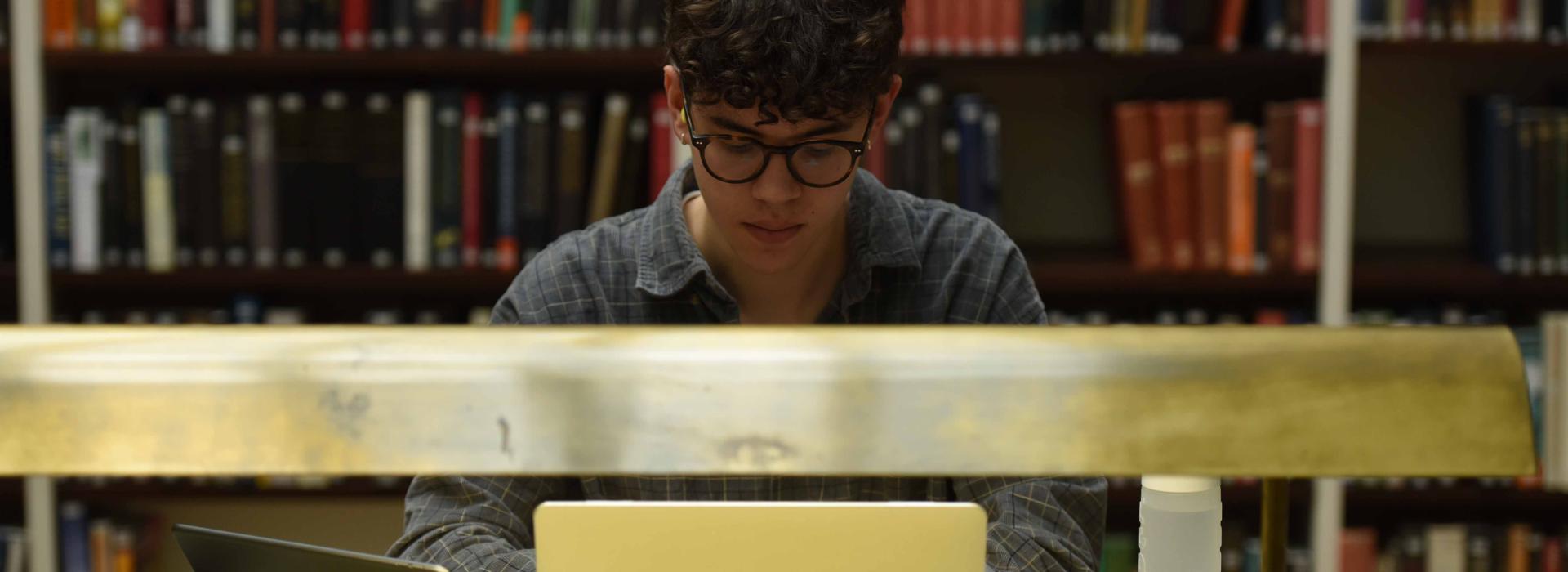
Peterhouse Kelvin Biological Sciences Essay Competition
We are pleased to announce the 2024 Peterhouse Kelvin Biological Sciences Essay Competition! This competition aims to give students the opportunity to explore scientific concepts and topics beyond the classroom, and to engage with scientific research.

Who can take part?
The Kelvin Biological Sciences Essay Competition is open to students in their penultimate year of study (Year 12 in England and Wales, S5 in Scotland, Year 13 in Northern Ireland, or equivalent) who are educated in the United Kingdom and Ireland.
Please make sure that you have read the submission guidelines and FAQs sections carefully before entering.
You can read a selection of the winning entries from last year’s competition here ( https://www.pet.cam.ac.uk/essay-competition-winners-2023 )
Submission Guidelines
Your essay should be no more than 2,000 words including footnotes and appendices on one of the four questions listed below. You should include a bibliography and ensure that all sources are referenced. The bibliography is excluded from the word limit. We know that not all students will be familiar with referencing, so you might find the following page from the University which includes a Guide to Harvard Referencing helpful ( https://libguides.cam.ac.uk/Official-Publications/referencing ) . Any other standard system of referencing style is also acceptable. Please note that all work should be your own, should not be produced by Artificial Intelligence, and should not include any work that has been or will be submitted to an exam board as part of your studies. The main focus of your essay should not be material previously or currently being studied as part of your school courses.
There is a maximum of four entries per school, preferably across the range of questions. Please note that this limit does not apply to Sixth Form Colleges where year groups are over 1000 students in size. All entries must be approved by a teacher, so please make sure a teacher at your school knows that you are entering. On the submission form you will be asked to provide a name and contact information for the teacher who will be supporting your application. If more than four entries are submitted by one school, we will contact the referees at this school to let us know which submissions are to be considered. Schools with lots of potential entrants may wish to run their own internal competition before the chosen answers are submitted to us for consideration.
Submissions will close on Monday 29th April at 23:59 pm GMT . We are unable to consider essays which have not been submitted by this deadline.
Your essay must be submitted as a PDF via the following form: https://cambridge.eu.qualtrics.com/jfe/form/SV_080XQThHYlhMuPk Please ensure that all pages in your essay are numbered, and that your name and school appears clearly on the first page. You should name your PDF file in the following format: Question number-Surname-First Initial e.g. Q2-Smith-T. Your teacher will then receive an email from Peterhouse asking them to confirm that you are eligible and that your essay complies with our guidelines. They will need to complete this by Tuesday 7th of May – please do make sure that they are aware of this.
Kelvin Biological Sciences Essay Competition Questions – 2024
- Why do duckbill platypuses fluoresce under UV light?
- Mitochondria are always shown as ovals; in reality they come in all sorts of shapes and sizes. Why?
- Why are there so few venomous mammals and no birds, whereas there are so many venomous reptiles?
- Reintroduction of ecosystem engineers (e.g. beavers) can have major impacts on the environment. What species would you reintroduce (or introduce) to the British Isles and why has this not been done already?
Summary of Key Dates
Deadline for submissions – Monday 29th April 23:59 pm GMT
Deadline for teacher confirmation – Tuesday 7th May 23:59 pm GMT
Can I answer more than one of the four questions for the 2024 Kelvin Essay Competition?
We ask that students only submit one essay per person.
Can I make any changes once I have submitted my essay using the above form?
Please note that once you have submitted your entry it is not possible to make any changes – please ensure you are happy with your work before pressing ‘submit’.
Will I receive feedback on my essay?
Unfortunately, due to the high volume of submissions, it is not possible to provide feedback on individual essays.
Why do I need to include contact information for a teacher at my school, and who should this be?
After you submit your essay we get in touch with a contact at your school so that they can confirm you are eligible for the competition, and that the essay is your own work. This can be any teacher at your school who knows you, for example, the Head of Biology, one of your subject teachers, your form tutor, or your Head of Year.
The competition has a prize pool of £750, which will be shared between the winners. Winners will be contacted by email - please make sure your contact details are entered correctly! A prizegiving ceremony will be held in Cambridge in summer 2024.
If you have any further questions relating to the competition, please email us at [email protected] .
This annual Essay Competition aims to raise awareness of the systematic study of language as an interesting and multifaceted subject in and of itself. It is hoped that the Prize will encourage students with an interest in linguistics to explore this further and to apply for a University course in this subject. In addition, the Prize aims to recognise the achievements of high-calibre students from whatever background they may come, as well as the achievements of those who teach them.
The competition is open to all students with an interest in how language works regardless of the specific subjects they are currently studying at A-Level (or similar qualification). For example, it may be of interest to students taking A-Levels in Modern Languages, English Language or Classics, but also to students taking Psychology or Mathematics. The competition is for students who have not yet started the final year of secondary education (this would be students up to Year-12 (Lower 6th) for students in England and Wales; the competition is open to any international student who wishes to take part).
The topic for the 2024 competition is as follows:
People often assume that speaking figuratively rather than literally is just a stylistic choice which does not add anything to the substance of the message they wish to convey. However, recent research reports that football players run faster if they are instructed to do so using figurative language such as similes and metaphors (‘sprint as if you are a jet taking off into the sky ahead’) compared to literal instructions (‘sprint as fast as you can’). Other research reports that the metaphor chosen to frame a debate about a topic, such as measures to be taken against crime (‘crime is a beast that ravages our city’ vs ‘crime is a disease that is spreading through our city’) impacts people’s preferred solutions.
What do these observations tell us about figurative language and its uses? Consider how figurative language works, its relation to thought, and how language (figurative and literal) is represented in the mind.
You may wish to consult some of the following open-access resources:
https://www.bbc.co.uk/newsround/68465717
https://www.zmescience.com/science/news-science/coaches-encourage-football-players-to-sprint-like-a-jet-to-run-faster-and-it-works/
https://en.wikipedia.org/wiki/Conceptual_metaphor
https://en.wikipedia.org/wiki/Embodied_cognition
https://journals.plos.org/plosone/article?id=10.1371/journal.pone.0016782
https://journals.plos.org/plosone/article?id=10.1371/journal.pone.0052961
https://royalsocietypublishing.org/doi/10.1098/rstb.2021.0375
https://www.thoughtco.com/what-is-a-dead-metaphor-1690418
https://www.yourdictionary.com/articles/examples-dead-metaphors
https://aeon.co/essays/how-changing-the-metaphors-we-use-can-change-the-way-we-think
https://behavioralscientist.org/5-studies-the-ubiquity-of-metaphor/
https://www.creativeml.ox.ac.uk/what-metaphor-and-how-does-it-work/index.html
https://tesl-ej.org/wordpress/issues/volume18/ej70/ej70a5/
Candidates are invited to submit an essay of between 2,000 and 2,500 words (references do not count towards the word limit; any widely used referencing style is acceptable as long as you use it consistently). Essays should be submitted using the form below by the deadline of 12 noon on Thursday 1 August 2024. Late submissions cannot be accepted. All candidates will be notified with the results of the competition by mid September. Due to the volume of essays received we are unable to provide any feedback on the essays themselves.
Any queries should be directed to Professor Napoleon Katsos at [email protected] .
The competition carries a First Prize of £600, to be split equally between the candidate and his or her school or college, and a Second Prize of £400, which again is to be shared equally between the candidate and his or her school or college. The school or college’s portion of each prize will be issued in the form of book tokens with which to buy linguistics books. In addition, up to three further essays of a high quality will be commended.
How information about you will be used
Your email address will only be used for the purposes of contacting you in regards to your submission . It will not be used for any other reason or given or sold to any other company or organization. You will receive a copy of the information you have provided to the email address you specify.
About your school
Past prize winners.
- 1st Prize: Aran Johstone-Trias (Twyford Church of England High School)
- 2nd Prize: Maisie Haenelt (Lichfield Cathedral School)
- 1st Prize: Shivan Arora (St Paul’s School)
- 2nd Prize: Rosalie Smith (Tonbridge Grammar School)
Commendations:
- Hannah Furnkranz (Wallington High School for Girls)
- Victoria Mnatsakanyan (Lawrence Park Collegiate Institute)
- Brandon Yoo (Dwight School, Seoul)
- 1st Prize: Eleanor Jones (Leicester Grammar School)
- 2nd Prize: Amy Freeman (Woodford County High School)
- 1st Prize: Lucia Guzy-Kirkden (Wyggeston & Queen Elizabeth I College)
- 2nd Prize: Lizzy Abel (Withington Girls’ School)
- 1st Prize: Eliza Logan (Lady Margaret School)
- 2nd Prize: James Morley (Harlington Upper School)
- 1st Prize: Oliver Pearey (Colchester Royal Grammar School)
- 2nd Prize: Eloise Hunt (King Edward VI College, Stourbridge)
- 1st Prize: Julia Southern-Wilkins (Bedford Girls’ School)
- 2nd Prize: Martha Birtles (Holy Cross College, Bury)
- 1st Prize: Shefali Chander (Westminster School)
- 2nd Prize: David Fenton-Smith (High Storrs School)
- Joint 1st Prize: Olivia Bonsall (Holy Cross College, Bury)
- Joint 1st Prize: Georgina Connors (The British School of Paris)
- 2nd Prize: Kirsty Bailey (Croydon High School)
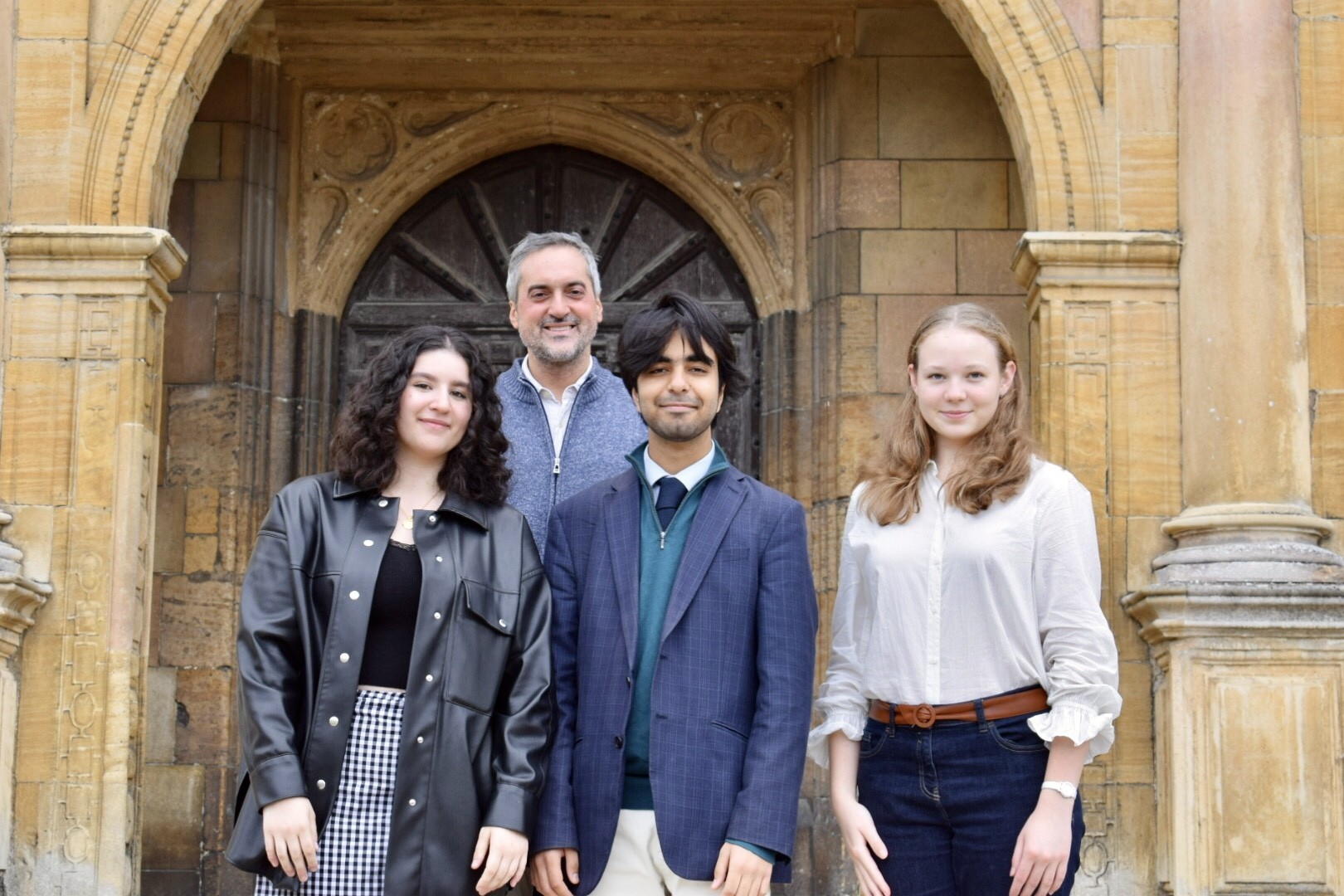
- Share on Twitter
- Share on Facebook
- Share on LinkedIn
- Share via email
- previous post: Gould prize for essays in English Literature
- next post: Philosophy Essay Prize
Access and Outreach Hub
Privacy overview.
Essay Competition
“the ideas of economists… both when they are right and when they are wrong, are more powerful than is commonly understood… indeed the world is ruled by little else” , j. m. keynes (general theory, 1936), essay competition 2023.
We received over 750 eligible submissions this year, with each one being hand-read and marked by our panellists at the University of Cambridge. Overall, we were thoroughly impressed by the quality of the responses to some of the most challenging questions in the competition’s history. We would like to thank every student that submitted an essay this year, and extend our warmest congratulations to the winners and shortlisted essays named below.
We are delighted to announce that the winner of the 2023 Marshall Society Essay Competition is David Lu of Raffles Institution, Singapore. David’s essay in response to Question 4 deftly balanced advanced economic theories with real-world data, clear explanations, and rhetorical flair, and was a pleasure to read. We look forward to publishing it in the forthcoming issue of The Dismal Scientist , the magazine of the Marshall Society, and awarding our top prize of £50.
In 2nd place is You Peng of Shenzhen College of International Education, China. Peng’s essay in response to Question 2 was theoretically advanced and well structured, and we would’ve liked to see even more real-world application. It will likewise be published and receive a finalist prize of £25.
In 3rd place is Hanyun Qian of Suzhou Foreign Language School, China. Hanyun’s essay in response to Question 5 was extremely original, insightful, and entertaining to read, and we would’ve liked to see an even tighter focus on the question set. It will likewise be published and receive a finalist prize of £25.
Our shortlisted essays, in no particular order, were as follows:
To everyone that took part in the competition, thank you for the time and care spent in preparing your essay, and all the best for your future studies. We hope you’re looking forward to the 2024 edition of the essay competition.
A reminder of the essay questions set this year is as follows:
- In what ways could Artificial Intelligence reshape the labour market? Will it usher in Keynes’ ‘age of leisure’?
- ‘Policymakers can’t exploit the Phillips curve to reduce unemployment due to the Lucas critique.’ Evaluate this statement.
- The US Federal Child Tax Credit is scheduled to revert from $2,000 to $1,000 by 2025. Is this policy a mistake?
- Tensions between the US and China have been steadily increasing. Is it in the US’ interest to decouple from China economically?
- ‘There were no meaningful long-run changes in living standards until the Industrial Revolution.’ Discuss.
- Has Economics run out of big new ideas? If so, what are the implications? If not, justify with an example.
Top login menu
Search form.
- Bell Burnell Society Essay Competition 2023
- She Talks Science
Main page content
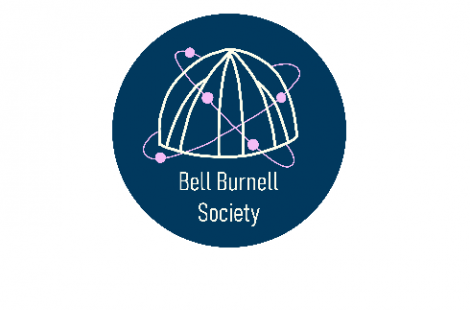
The Murray Edwards College Bell Burnell Society is welcoming entries for its annual Essay Competition. The competition is open to any Sixth Form student (or equivalent). We encourage entries from interested students studying any combination of subjects who are eager to develop and showcase their independent study and writing skills.
Please answer one of the following questions:
- Is gene therapy the future of medical advancement?
- How do you define intelligence?
- Is technology to blame for the accelerated rate of global warming and the deterioration of our climate?
- How will quantum technology change our world by 2100?
Essays should be between 1,000 and 3,000 words, and should be referenced in a standard format. More information is available in the Terms and Conditions .
The deadline for essay submission is the 26th July, 12 Noon. Please send your essay as well as a completed Entry Form (including your full name, school address and email address) to [email protected] with the email subject 'Submission for Essay Competition 2023'.
We aim to decide on a winner by the end of August.
1st place- £50 2nd place- £30 3rd place- £20
Judging Criteria
- Your essay will be judged on the following criteria:
- Clear presentation of information and focus on answering the question
- Scientific accuracy of the essay
- Creativity and originality in approach to the question
- Demonstration of understanding beyond the AS/A level syllabus
- Use of examples and evidence
- Range, credibility and validity of sources used
- Spelling, punctuation and grammar
- Plan your essay before you start and use a structure that is clear, coherent, and presents the information in an engaging way
- There is no need to meet the upper word limit — try to keep your points concise and highlight key pieces of evidence, rather than telling us everything you know about the topic
- Consider several different approaches to the question and try to include a range of ideas in your essay
- Use reliable scientific sources to back up your claims, such as textbooks, articles from New Scientist or BBC News Science & Environment , and scientific articles
- Feel free to use subheadings to help you structure your essay clearly
- You can use diagrams to illustrate key points — remember to include a caption and refer to your diagram in the essay
- Include a list of references at the end of your essay and make sure you keep your referencing style consistent — you can use this website as a guide: www.mendeley.com/guides/apa-citation-guide
- There is no need to cite facts from your AS/A level textbook
- Try to avoid colloquial language or a conversational tone
- Make sure your formatting is consistent throughout (e.g. same font)
- Make sure you proofread your work before submitting!
Related posts
Murray edwards college franklin society: essay competition 2021, related information, school winner: sugar and alcohol in space, abi caple: wild swimming in newquay, murray edwards to host a-level students in stem smart pilot programme, ashley anh nguyen: travelling in the middle east.
Essay Competition: Win a 100% Scholarship With Immerse Education
Take part in the Immerse Education Essay Competition for your chance to win a full or partial scholarship to our university and career preparation programmes
12th September 2024: Submission Deadline
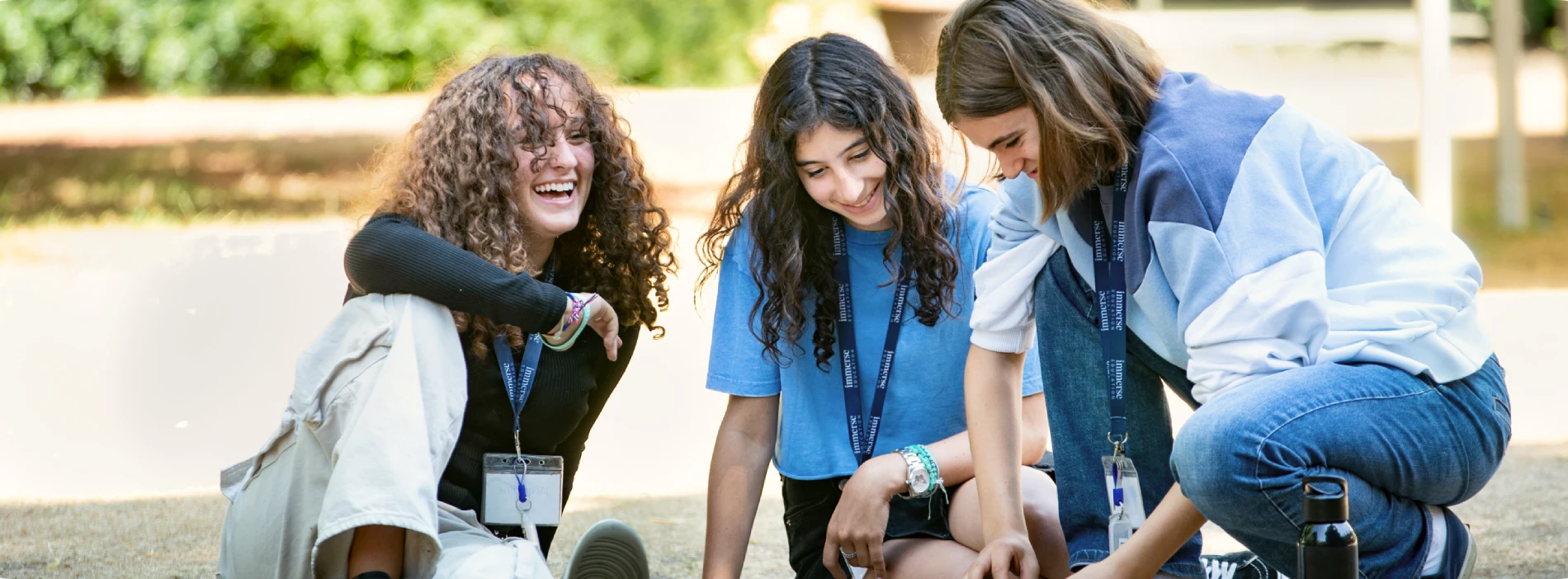
Competition Open
full scholarships Awarded each year
entries each year
Share Your Success
Scholarship Award Certificate PDFs For Winners
What is the Essay Competition?
The Immerse Education Essay Competition provides the opportunity for students aged 13-18 to submit essay responses to a question of their choice relating to a subject of interest. There are over twenty questions to choose from which can be found in our full Essay Competition Guide. 10 winners will receive a 100% scholarship to study with us at a world-leading university of their choosing. Outstanding runners-up also receive partial scholarships.
23rd February 2024
Competition opens
12th September 2024
Competition closes
17th October 2024
Results announced
January, July & August 2025
Programme dates
Who Can Apply?
- The Immerse Education Essay Competition is open to students worldwide of all nationalities. You must be aged between 13-18 during your chosen programme.
10 winners will receive a 100% scholarship. Take a look at previous essay competition winners.
Runners Up will be awarded partial scholarships of up to 50% to study their chosen subject with Immerse. The number of runners-up will be determined by the number of entries received and the quality of the work submitted. The next category of entrants who are not runner-ups receive partial scholarships worth up to 20%.
Our Guest Judges
Programmes our scholarship can be redeemed against, reviews and winners, what do our alumni say.
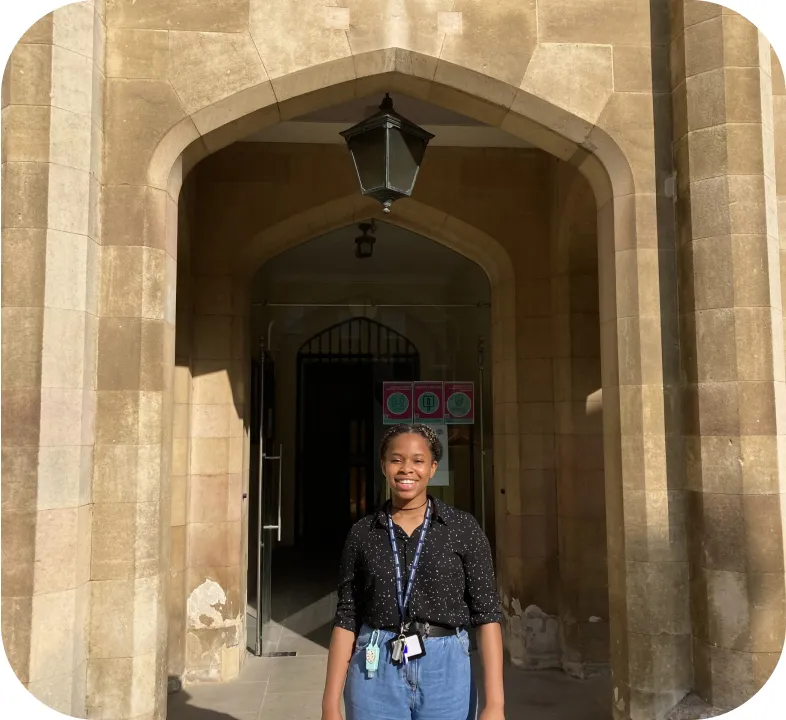
I loved the little conversations we had when a question about the topic turned into explanations of the ethical, personal and economic issues that surround medicine. Overall, I found my lessons very beneficial. I know so much more about medicine and its different subsets, but also about what a career in medicine really looks like.
Immerse alumni, and scholarship winner
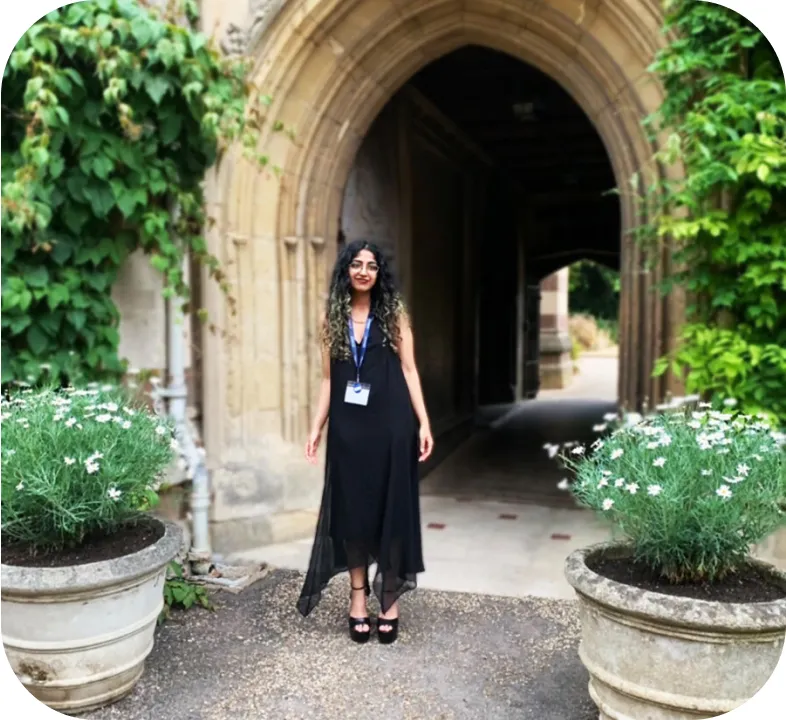
I could see that the essay competition was an incredible opportunity for international students to win a scholarship purely based on merit. More importantly, after doing some more research, I realised that the process for choosing winners was incredibly fair, that everyone would get an equal chance regardless of their socio-economic background, race, nationality, gender, etc.
100% Scholarship Winner
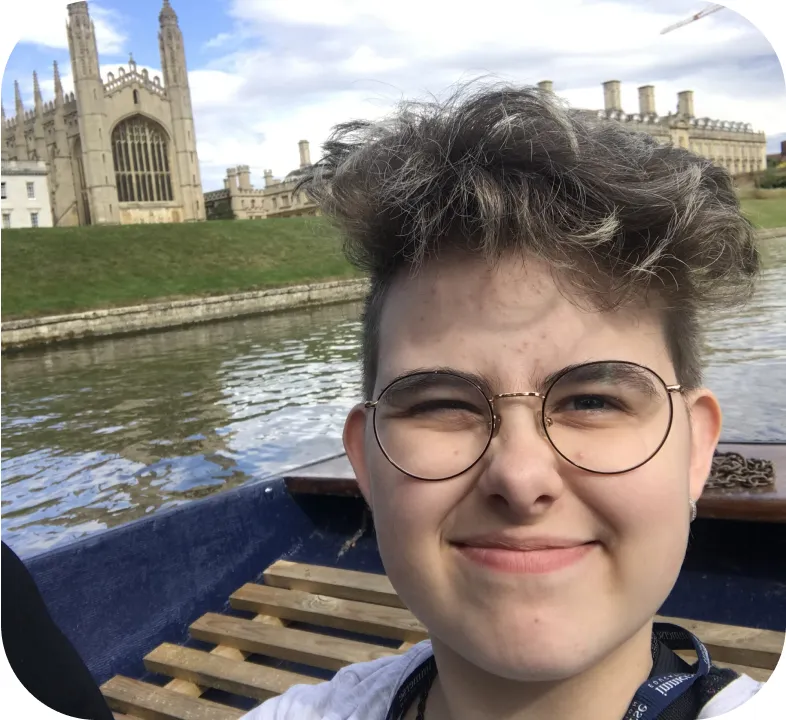
I enrolled because I wanted to expand my knowledge of physics and meet other people with the same interests as myself. Both of which I was successful in doing! My favourite aspect of the programme was the small class sizes – this helped both the tutor and students with learning and understanding the subject.
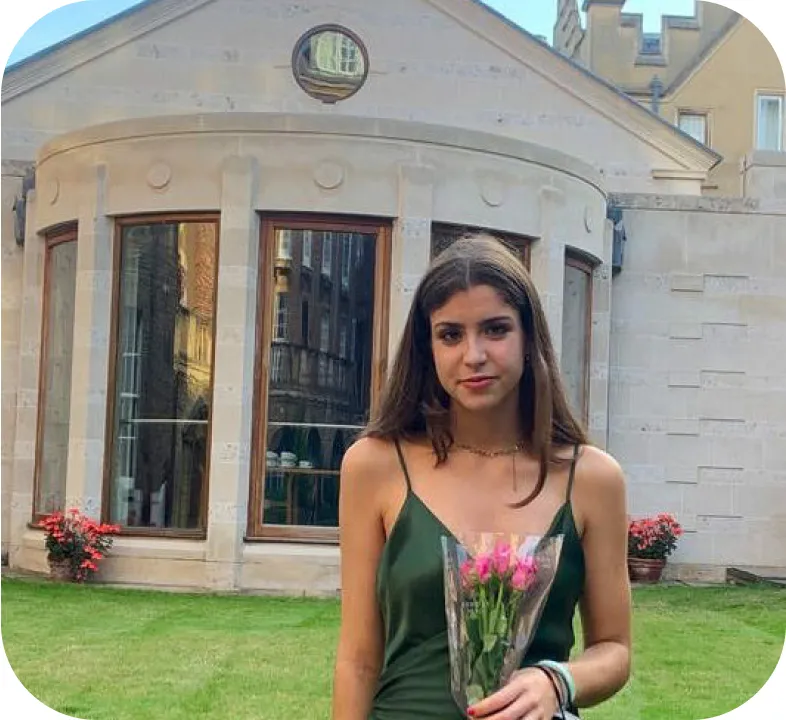
Immerse was very fun as well as useful. You were able to experience what it would be like if you studied here for university. The most beneficial part of the course was being able to see what International Relations is like, and it helped me decide what I want to study in the future.
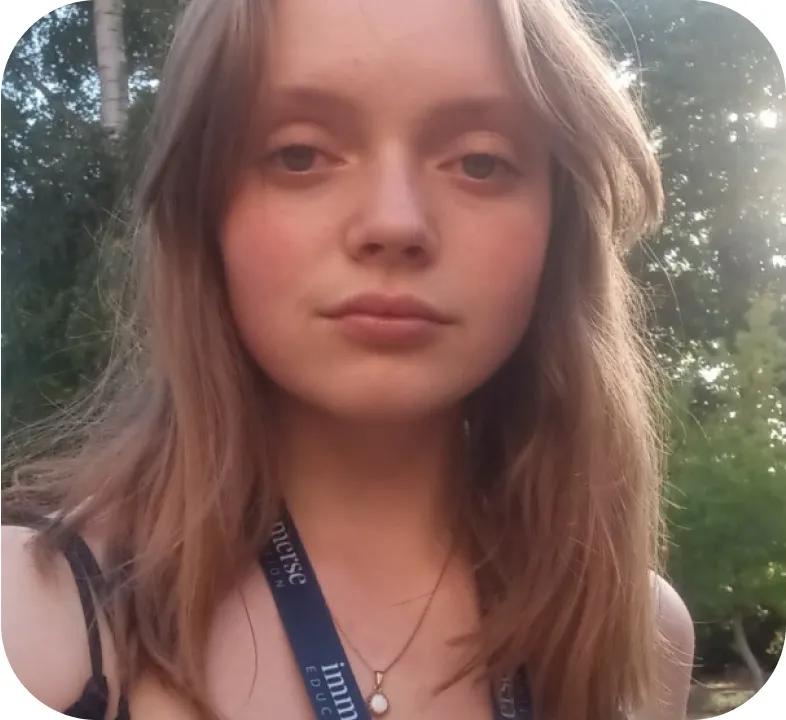
My school invited everyone to participate, and the further I read about Immerse Education, the more motivated I was to enter the competition. Not only did I have the chance to study a subject I love, I would also be able to expand on my essay skills since writing has always been a passion of mine.
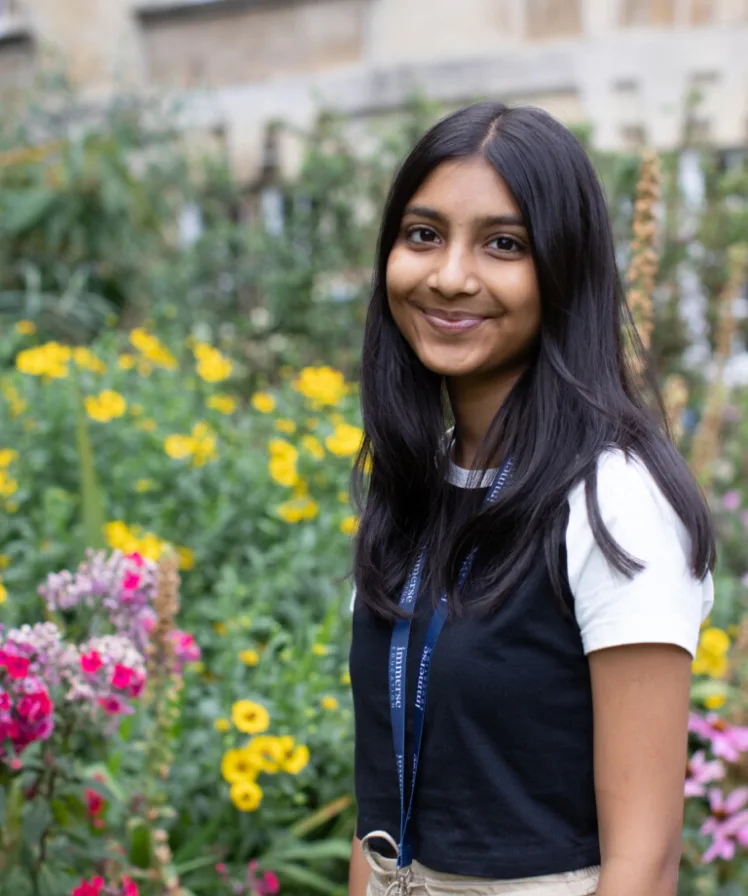
I really wanted to go to medicine summer school this year, and so I literally was searching for summer school opportunities and Immerse is one that came up. Through this, I found out about the essay competition and I decided to submit an answer. Immerse was very helpful whilst I was writing my essay, especially with things like the referencing guide.
I’m 16, so I’ve never written an academic essay before, so it was really important that I actually knew what I was doing in the first place and it definitely helped me with that. The programme so far has been very enriching. It’s helped me understand more about medicine and made me realise that this is what I want to do in life. Meeting new friends, tutors, and the mentors, they’re all amazing. My favourite things on the programme have been the evening activities, like murder mystery night. I am so happy to be able to have seen people that are like minded, and competitive as well. I really think that the tutors and the mentors have all been very supportive of me.
Academic Insights, Medicine
Hear From a Previous Scholarship Winner

The Immerse Education Essay Competition is open to entries from young people aged 13-18 interested in all subjects, from Architecture to Medicine, Creative Writing to Film Studies. If participants are successful, they should be aged 13 and above before the start of their programme.
Immerse provides a full essay-writing guide which is sent to your email address once you register your interest in the competition. This guide includes a full list of essay questions, our essay specification, top tips for writing an academic essay, referencing guidance, our terms and conditions and guidance on plagiarism! Registering interest also ensures that you’re on track to submitting your essay on time, through a series of helpful reminder prompts. To support further you can register for our webinars , which offer top tips and guidance with essay writing from our experts. You are also welcome to explore our creative writing resources .
Funded scholarship to study abroad: Our essay competition offers students like you the chance to win a full or partial scholarship to one of our Online Programmes or residential programmes in locations such as Oxford, Cambridge, Sydney, London and more.
Ongoing support from Immerse while you write: Full support from our team as you write your essay, with free guides and top tips to help you along the way. Sign up to receive our full Essay competition Guide and free tips and tricks as you write. You can also follow us on Instagram and Tik Tok to get more useful essay writing tips.
Demonstrate what you know: The competition is a chance for you to demonstrate your content knowledge by answering advanced university-style questions.
Build your skills and knowledge: The opportunity to apply and advance your essay writing skills. You will likely learn something new in the process!
Develop your self-discipline: A chance to strengthen your self-discipline as you commit to a challenging project and complete it from start to finish.
If you win a scholarship via the Essay Competition 2024/2025 you can use it toward any residential course in any of our locations. Use your scholarship to enrol on one of our renowned online programmes* or enriching in-person/residential summer school programmes in cultural melting pots such as Cambridge, Oxford, London or Sydney and more. * Essay competition schorlaships cannot be redeemed against online Intensive programmes.
No, there is no entry fee and you do not need to have already enrolled onto any of our programmes to take part in the essay competition.
The deadline for all essay entries for the last round of the competition is 4th January 2024. The next deadline will most likely be on 12th September 2024.
Register to receive free Essay Competition guidance
The Immerse Education Essay Competition provides the opportunity for students aged 13-18 to submit essay responses to a pre-set question relating to their chosen subject. Register interest to receive your guide with the comprehensive list of questions including:
- – Essay Specifications
- – Top Tips for Writing an Academic Essay
- – Referencing Guidance
- Name * First Name Last Name
- School City
- School Country
- School Name
- I would like to receive updates from Immerse Education. See Privacy Policy
- First Name *
- Family Name *
- Phone Number
- I'm a Parent
- I'm a Student
Would you like to receive anything else?
- Prospectuses
- Residential Syllabus Overviews (ages 13-15)
- Residential Syllabus Overviews (ages 16-18)
- Online Syllabus Overviews (ages 13-18)
- Immerse Education Prospectus 2024
- Career Insights - London Course Guide
- Career Insights New York
- Career Insights San Francisco
- Online Insights Prospectus
- Online Research Programme Prospectus
- Academic Insights - Cambridge & Oxford Prospectus
- Academic Insights Sydney
- Academic Insights Toronto
- Female Future Leaders
- Dates & Fees
- Architecture
- Artificial Intelligence
- Business Management
- Business Management (Sydney)
- Business Management (Career Insights)
- Computer Science
- Creative Writing
- Creative Writing (Sydney)
- Creative Writing & Film (Career Insights)
- Earth Sciences
- Engineering
- Engineering (Career Insights)
- Engineering (Sydney)
- Film Studies
- International Relations
- International Relations (Sydney)
- Medicine (Career Insights)
- Medicine (Sydney)
- Natural Sciences
- Psychology (Sydney)
- Veterinary Studies (Sydney)
- Banking & Finance (New York)
- Business Management (London)
- Data Science & Analytics (San Francisco)
- Creative Writing & Film (London)
- Entrepreneurship (San Francisco)
- Engineering (London)
- Fashion & Design (New York)
- Health Tech & Biotechnology (San Francisco)
- Marketing & Entertainment (New York)
- Medicine (London)
- Law (New York)
- Software Development & AI (San Francisco)
- Architecture & Design (Career Insights)
- Biotechnology
- Business Management (Toronto)
- Computer Science & AI (Toronto)
- Criminology
- Engineering (Toronto)
- English Literature
- Fine Art (Career Insights)
- Game Design (Career Insights)
- Law (Career Insights)
- Mathematics
- Medicine (Toronto)
- Nanotechnology
- Online Research Programme
- Online Insights
- Computer Science & AI
- Sustainability
Complete Your Request
- Yes. See Privacy Policy.

Essay COMPETITION
2024 global essay prize, registrations are now open all essayists must register here before friday 31 may, 2024.
The John Locke Institute encourages young people to cultivate the characteristics that turn good students into great writers: independent thought, depth of knowledge, clear reasoning, critical analysis and persuasive style. Our Essay Competition invites students to explore a wide range of challenging and interesting questions beyond the confines of the school curriculum.
Entering an essay in our competition can build knowledge, and refine skills of argumentation. It also gives students the chance to have their work assessed by experts. All of our essay prizes are judged by a panel of senior academics drawn from leading universities including Oxford and Princeton, under the leadership of the Chairman of Examiners, former Cambridge philosopher, Dr Jamie Whyte.
The judges will choose their favourite essay from each of seven subject categories - Philosophy, Politics, Economics, History, Psychology, Theology and Law - and then select the winner of the Grand Prize for the best entry in any subject. There is also a separate prize awarded for the best essay in the junior category, for under 15s.
Q1. Do we have any good reasons to trust our moral intuition?
Q2. Do girls have a (moral) right to compete in sporting contests that exclude boys?
Q3. Should I be held responsible for what I believe?

Q1. Is there such a thing as too much democracy?
Q2. Is peace in the West Bank and the Gaza Strip possible?
Q3. When is compliance complicity?
Q1. What is the optimal global population?
Q2. Accurate news reporting is a public good. Does it follow that news agencies should be funded from taxation?
Q3. Do successful business people benefit others when making their money, when spending it, both, or neither?

Q1. Why was sustained economic growth so rare before the later 18th century and why did this change?
Q2. Has music ever significantly changed the course of history?
Q3. Why do civilisations collapse? Is our civilisation in danger?
Q1. When, if ever, should a company be permitted to refuse to do business with a person because of that person’s public statements?
Q2. In the last five years British police have arrested several thousand people for things they posted on social media. Is the UK becoming a police state?
Q3. Your parents say that 11pm is your bedtime. But they don’t punish you if you don’t go to bed by 11pm. Is 11pm really your bedtime?

Q1. According to a study by researchers at four British universities, for each 15-point increase in IQ, the likelihood of getting married increases by around 35% for a man but decreases by around 58% for a woman. Why?
In the original version of this question we misstated a statistic. This was caused by reproducing an error that appeared in several media summaries of the study. We are grateful to one of our contestants, Xinyi Zhang, who helped us to see (with humility and courtesy) why we should take more care to check our sources. We corrected the text on 4 April. Happily, the correction does not in any way alter the thrust of the question.
Q2. There is an unprecedented epidemic of depression and anxiety among young people. Can we fix this? How?
Q3. What is the difference between a psychiatric illness and a character flaw?
Q1. “I am not religious, but I am spiritual.” What could the speaker mean by “spiritual”?
Q2. Is it reasonable to thank God for protection from some natural harm if He is responsible for causing the harm?
Q3. Does God reward those who believe in him? If so, why?

JUNIOR prize
Q1. Does winning a free and fair election automatically confer a mandate for governing?
Q2. Has the anti-racism movement reduced racism?
Q3. Is there life after death?
Q4. How did it happen that governments came to own and run most high schools, while leaving food production to private enterprise?
Q5. When will advancing technology make most of us unemployable? What should we do about this?
Q6. Should we trust fourteen-year-olds to make decisions about their own bodies?
ENTRY REQUIREMENTS & FURTHER DETAILS
Please read the following carefully.
Entry to the John Locke Institute Essay Competition 2024 is open to students from any country.
Registration
Only candidates who registered before the registration deadline of Friday, 31 May 2024 may enter this year's competition. To register, click here .
All entries must be submitted by 11.59 pm BST on the submission deadline: Sunday, 30 June 2024 . Candidates must be eighteen years old, or younger, on that date. (Candidates for the Junior Prize must be fourteen years old, or younger, on that date.)
Entry is free.
Each essay must address only one of the questions in your chosen subject category, and must not exceed 2000 words (not counting diagrams, tables of data, endnotes, bibliography or authorship declaration).
The filename of your pdf must be in this format: FirstName-LastName-Category-QuestionNumber.pdf; so, for instance, Alexander Popham would submit his answer to question 2 in the Psychology category with the following file name:
Alexander-Popham-Psychology-2.pdf
Essays with filenames which are not in this format will be rejected.
The candidate's name should NOT appear within the document itself.
Candidates should NOT add footnotes. They may, however, add endnotes and/or a Bibliography that is clearly titled as such.
Each candidate will be required to provide the email address of an academic referee who is familiar with the candidate's written academic work. This should be a school teacher, if possible, or another responsible adult who is not a relation of the candidate. The John Locke Institute will email referees to verify that the essays submitted are indeed the original work of the candidates.
Submissions may be made as soon as registration opens in April. We recommend that you submit your essay well in advance of th e deadline to avoid any last-minute complications.
Acceptance of your essay depends on your granting us permission to use your data for the purposes of receiving and processing your entry as well as communicating with you about the Awards Ceremony Dinner, the academic conference, and other events and programmes of the John Locke Institute and its associated entities.
Late entries
If for any reason you miss the 30 June deadline you will have an opportunity to make a late entry, under two conditions:
a) A late entry fee of 20.00 USD must be paid by credit card within twenty-four hours of the original deadline; and
b) Your essay must be submitted before 11.59 pm BST on Wednesday, 10 July 2024.
To pay for late entry, a registrant need only log into his or her account, select the relevant option and provide the requested payment information.
Our grading system is proprietary. Essayists may be asked to discuss their entry with a member of the John Locke Institute’s faculty. We use various means to identify plagiarism, contract cheating, the use of AI and other forms of fraud . Our determinations in all such matters are final.
Essays will be judged on knowledge and understanding of the relevant material, the competent use of evidence, quality of argumentation, originality, structure, writing style and persuasive force. The very best essays are likely to be those which would be capable of changing somebody's mind. Essays which ignore or fail to address the strongest objections and counter-arguments are unlikely to be successful .
Candidates are advised to answer the question as precisely and directly as possible.
The writers of the best essays will receive a commendation and be shortlisted for a prize. Writers of shortlisted essays will be notified by 11.59 pm BST on Wednesday, 31 July. They will also be invited to London for an invitation-only academic conference and awards dinner in September, where the prize-winners will be announced. Unlike the competition itself, the academic conference and awards dinner are not free. Please be aware that n obody is required to attend either the academic conference or the prize ceremony. You can win a prize without travelling to London.
All short-listed candidates, including prize-winners, will be able to download eCertificates that acknowledge their achievement. If you win First, Second or Third Prize, and you travel to London for the ceremony, you will receive a signed certificate.
There is a prize for the best essay in each category. The prize for each winner of a subject category, and the winner of the Junior category, is a scholarship worth US$2000 towards the cost of attending any John Locke Institute programme, and the essays will be published on the Institute's website. Prize-giving ceremonies will take place in London, at which winners and runners-up will be able to meet some of the judges and other faculty members of the John Locke Institute. Family, friends, and teachers are also welcome.
The candidate who submits the best essay overall will be awarded an honorary John Locke Institute Junior Fellowship, which comes with a US$10,000 scholarship to attend one or more of our summer schools and/or visiting scholars programmes.
The judges' decisions are final, and no correspondence will be entered into.
R egistration opens: 1 April, 2024.
Registration deadline: 31 May, 2024. (Registration is required by this date for subsequent submission.)
Submission deadline: 30 June, 2024.
Late entry deadline: 10 July, 2024. (Late entries are subject to a 20.00 USD charge, payable by 1 July.)
Notification of short-listed essayists: 31 July, 2024.
Academic conference: 20 - 22 September, 2024.
Awards dinner: 21 September, 2024.
Any queries regarding the essay competition should be sent to [email protected] . Please be aware that, due to the large volume of correspondence we receive, we cannot guarantee to answer every query. In particular, regrettably, we are unable to respond to questions whose answers can be found on our website.
If you would like to receive helpful tips from our examiners about what makes for a winning essay or reminders of upcoming key dates for the 2024 essay competition, please provide your email here to be added to our contact list. .
Thanks for subscribing!

The John Locke Institute's Global Essay Prize is acknowledged as the world's most prestigious essay competition.
We welcome tens of thousands of submissions from ambitious students in more than 150 countries, and our examiners - including distinguished philosophers, political scientists, economists, historians, psychologists, theologians, and legal scholars - read and carefully assess every entry.
I encourage you to register for this competition, not only for the hope of winning a prize or commendation, and not only for the chance to join the very best contestants at our academic conference and gala ceremony in London, but equally for the opportunity to engage in the serious scholarly enterprise of researching, reflecting on, writing about, and editing an answer to one of the important and provocative questions in this year's Global Essay Prize.
We believe that the skills you will acquire in the process will make you a better thinker and a more effective advocate for the ideas that matter most to you.
I hope to see you in September!
Best wishes,
Jamie Whyte, Ph.D. (C ANTAB )
Chairman of Examiners
Q. I missed the registration deadline. May I still register or submit an essay?
A. No. Only candidates who registered before 31 May will be able to submit an essay.
Q. Are footnote s, endnotes, a bibliography or references counted towards the word limit?
A. No. Only the body of the essay is counted.
Q. Are in-text citations counted towards the word limit?
A. If you are using an in-text based referencing format, such as APA, your in-text citations are included in the word limit.
Q. Is it necessary to include foo tnotes or endnotes in an essay?
A. You may not include footnotes, but you may include in-text citations or endnotes. You should give your sources of any factual claims you make, and you should ackn owledge any other authors on whom you rely.
Q. I am interested in a question that seems ambiguous. How should I interpret it?
A. You may interpret a question as you deem appropriate, clarifying your interpretation if necessary. Having done so, you must answer the question as directly as possible.
Q. How strict are the age eligibility criteria?
A. Only students whose nineteenth birthday falls after 30 June 2024 will be eligible for a prize or a commendation. In the case of the Junior category, only students whose fifteenth birthday falls after 30 June 2024 will be eligible for a prize or a commendation.
Q. May I submit more than one essay?
A. Yes, you may submit as many essays as you please in any or all categories.
Q. If I am eligible to compete in the Junior category, may I also (or instead) compete in another category?
A. Yes, you may.
Q. May I team up with someone else to write an essay?
A. No. Each submitted essay must be entirely the work of a single individual.
Q. May I use AI, such as ChatGPT or the like, in writing my essay?
A. All essays will be checked for the use of AI. If we find that any content is generated by AI, your essay will be disqualified. We will also ask you, upon submission of your essay, whether you used AI for any purpose related to the writing of your essay, and if so, you will be required to provide details. In that case, if, in our judgement, you have not provided full and accurate details of your use of AI, your essay will be disqualified.
Since any use of AI (that does not result in disqualification) can only negatively affect our assessment of your work relative to that of work that is done without using AI, your safest course of action is simply not to use it at all. If, however, you choose to use it for any purpose, we reserve the right to make relevant judgements on a case-by-case basis and we will not enter into any correspondence.
Q. May I have someone else edit, or otherwise help me with, my essay?
A. You may of course discuss your essay with others, and it is perfectly acceptable for them to offer general advice and point out errors or weaknesses in your writing or content, leaving you to address them.
However, no part of your essay may be written by anyone else. This means that you must edit your own work and that while a proofreader may point out errors, you as the essayist must be the one to correct them.
Q. Do I have to attend the awards ceremony to win a prize?
A. Nobody is required to attend the prize ceremony. You can win a prize without travelling to London. But if we invite you to London it is because your essay was good enough - in the opinion of the First Round judges - to be at least a contender for First, Second or Third Prize. Normally the Second Round judges will agree that the short-listed essays are worth at least a commendation.
Q. Is there an entry fee?
A. No. There is no charge to enter our global essay competition unless you submit your essay after the normal deadline, in which case there is a fee of 20.00 USD .
Q. Can I receive a certificate for my participation in your essay competition if I wasn't shortlisted?
A. No. Certificates are awarded only for shortlisted essays. Short-listed contestants who attend the award ceremony in London will receive a paper certificate. If you cannot travel to London, you will be able to download your eCertificate.
Q. Can I receive feedba ck on my essay?
A. We would love to be able to give individual feedback on essays but, unfortunately, we receive too many entries to be able to comment on particular essays.
Q. The deadline for publishing the names of short-listed essayists has passed but I did not receive an email to tell me whether I was short-listed.
A. Log into your account and check "Shortlist Status" for (each of) your essay(s).
Q. Why isn't the awards ceremony in Oxford this year?
A. Last year, many shortlisted finalists who applied to join our invitation-only academic conference missed the opportunity because of capacity constraints at Oxford's largest venues. This year, the conference will be held in central London and the gala awards dinner will take place in an iconic London ballroom.
TECHNICAL FAQ s
Q. The system will not accept my essay. I have checked the filename and it has the correct format. What should I do?
A. You have almost certainly added a space before or after one of your names in your profile. Edit it accordingly and try to submit again.
Q. The profile page shows my birth date to be wrong by a day, even after I edit it. What should I do?
A. Ignore it. The date that you typed has been correctly input to our database.
Q. How can I be sure that my registration for the essay competition was successful? Will I receive a confirmation email?
A. You will not receive a confirmation email. Rather, you can at any time log in to the account that you created and see that your registration details are present and correct.
TROUBLESHOOTING YOUR SUBMISSION
If you are unable to submit your essay to the John Locke Institute’s global essay competition, your problem is almost certainly one of the following.
If so, please proceed as indicated.
1) PROBLEM: I receive the ‘registrations are now closed’ message when I enter my email and verification code. SOLUTION. You did not register for the essay competition and create your account. If you think you did, you probably only provided us with your email to receive updates from us about the competition or otherwise. You may not enter the competition this year.
2) PROBLEM I do not receive a login code after I enter my email to enter my account. SOLUTION. Enter your email address again, checking that you do so correctly. If this fails, restart your browser using an incognito window; clear your cache, and try again. Wait for a few minutes for the code. If this still fails, restart your machine and try one more time. If this still fails, send an email to [email protected] with “No verification code – [your name]” in the subject line.
SUBMITTING AN ESSAY
3) PROBLEM: The filename of my essay is in the correct format but it is rejected. SOLUTION: Use “Edit Profile” to check that you did not add a space before or after either of your names. If you did, delete it. Whether you did or did not, try again to submit your essay. If submission fails again, email [email protected] with “Filename format – [your name]” in the subject line.
4) PROBLEM: When trying to view my submitted essay, a .txt file is downloaded – not the .pdf file that I submitted. SOLUTION: Delete the essay. Logout of your account; log back in, and resubmit. If resubmission fails, email [email protected] with “File extension problem – [your name]” in the subject line.
5) PROBLEM: When I try to submit, the submission form just reloads without giving me an error message. SOLUTION. Log out of your account. Open a new browser; clear the cache; log back in, and resubmit. If resubmission fails, email [email protected] with “Submission form problem – [your name]” in the subject line.
6) PROBLEM: I receive an “Unexpected Error” when trying to submit. SOLUTION. Logout of your account; log back in, and resubmit. If this resubmission fails, email [email protected] with “Unexpected error – [your name]” in thesubject line. Your email must tell us e xactly where in the submission process you received this error.
7) PROBLEM: I have a problem with submitting and it is not addressed above on this list. SOLUTION: Restart your machine. Clear your browser’s cache. Try to submit again. If this fails, email [email protected] with “Unlisted problem – [your name]” in the subject line. Your email must tell us exactly the nature of your problem with relevant screen caps.
READ THIS BEFORE YOU EMAIL US.
Do not email us before you have tried the specified solutions to your problem.
Do not email us more than once about a single problem. We will respond to your email within 72 hours. Only if you have not heard from us in that time may you contact us again to ask for an update.
If you email us regarding a problem, you must include relevant screen-shots and information on both your operating system and your browser. You must also declare that you have tried the solutions presented above and had a good connection to the internet when you did so.
If you have tried the relevant solution to your problem outlined above, have emailed us, and are still unable to submit before the 30 June deadline on account of any fault of the John Locke Institute or our systems, please do not worry: we will have a way to accept your essay in that case. However, if there is no fault on our side, we will not accept your essay if it is not submitted on time – whatever your reason: we will not make exceptions for IT issues for which we are not responsible.
We reserve the right to disqualify the entries of essayists who do not follow all provided instructions, including those concerning technical matters.
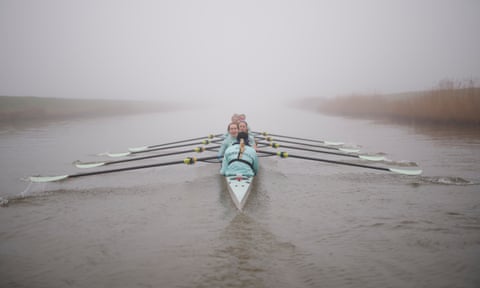
Pulling together: how Cambridge came to dominate the Boat Race – a photo essay
The race along the River Thames between England’s two greatest universities spans 195 years of rivalry and is now one of the world’s oldest and most famous amateur sporting events. Our photographer has been spending time with the Cambridge University Boat Club over the past few months as they prepare for 2024’s races
T he idea of a Boat Race between the two universities dates back to 1829, sparked into life by a conversation between Old Harrovian schoolfriends Charles Merivale, a student at the time at St John’s College Cambridge, and Charles Wordsworth who was at Christ Church Oxford. On 12 March that year, following a meeting of the newly formed Cambridge University Boat Club, a letter was sent to Oxford.
The University of Cambridge hereby challenge the University of Oxford to row a match at or near London each in an eight-oar boat during the Easter vacation.
From then, the Cambridge University Boat Club has existed to win just one race against just one opponent, something Cambridge has got very good at recently. Last year the Light Blues won every race: the open-weight men’s and women’s races, both reserve races, plus both lightweight races – six victories, no losses, an unprecedented clean sweep. Cambridge women’s open-weight boat, or blue boat, has won the last six Boat Races while the men’s equivalent have won five out of the last seven. In such an unpredictable race, where external factors can play a large part, this dominance is startling.
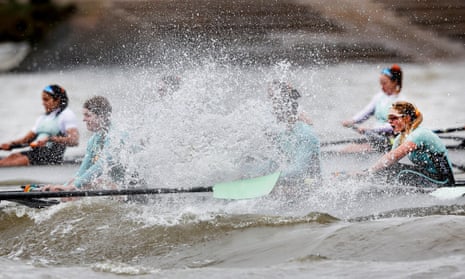
Thames trials
Rough water as the two women’s boats make their way along the River Thames near Putney Embankment during the Cambridge University Boat Race trials.
It’s a mid-December day by the River Thames. The sky and water merge together in a uniform battleship grey and the bitter north wind whips the tops off the waves. Outside a Putney boathouse two groups of tense-looking women dressed in duck-egg blue tops and black leggings with festive antlers in their hair are huddling together, perhaps for warmth, maybe for solidarity. The odd nervous bout of laughter breaks out. For some of them this is about to be their first experience of rowing on the Tideway, a baptism of fire on the famous stretch of London water where the Boat Race takes place. “Perfect conditions,” remarks Paddy Ryan, the head coach for Cambridge University women, for this is trial eights day, when friends in different boats duel for coveted spots in the top boat.
A couple of hours later these women along with their male equivalents will have pushed themselves to the absolute limit, so much so that several of the men are seen trying to throw up over the side of their boats at the finish under Chiswick Bridge. This may be brutal but it’s just the start. For these students the next few months are going to be incredibly tough, balancing academic work with training like a professional athlete. Through the harshest months of the year they will be focused on preparing for the end of March and a very simple goal: beating Oxford in the Boat Race.
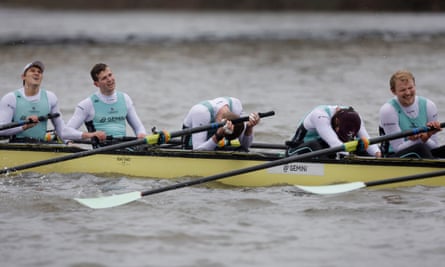
Agony for one of the men’s boats after the finish of the race near Chiswick Bridge during the Cambridge University Boat Race trials.
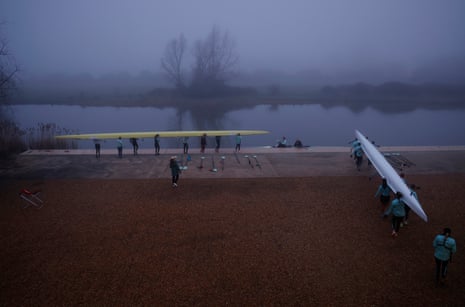
Ely early mornings
Two of the women’s boats head out in the early morning for a training session on the Great Ouse.
Early winter mornings on the banks of the Great Ouse, well before the sun has risen, can be pretty bleak. In the pitch black a batch of light blue minivans drop off the men and women rowers together at the sleek Ely boathouse that was opened in 2016 at the cost of £4.9m – it’s here that all Cambridge’s on-water training takes place. Very soon a fleet of boats carrying all the teams takes to the water for a training session that may last a couple of hours. Then it’s a quick change, a lift to the train station and back to Cambridge for morning lectures.

The women’s squad head into the Ely boathouse after a 6am drop-off.
As a rower descends the stairs to the bays where the boats are stored, there is a clear indication of why it was built and why they are there. “This is where we prepare to win Boat Races,” a sign says. Since this boathouse was built, Cambridge have won 30 of the 37 races across all categories.
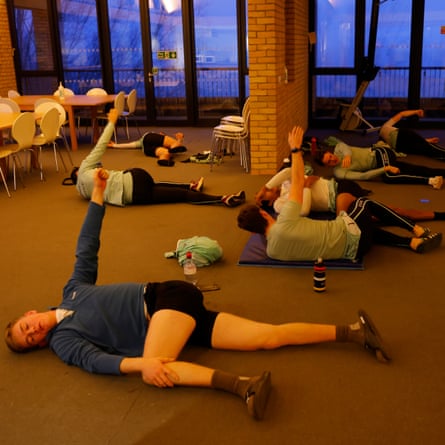
Top: The men’s squad stretch in the boathouse before an early morning training session and a member of the men’s blue boat descends the stairs into where the boats are kept. Below: One of the men’s teams set off for early morning training and the women’s blue boat rows past the women’s lightweight crew during a training session.
It’s a far cry from the old tin sheds with barely any heating and no showers. These current facilities are impressive, enabling the entire men’s and women’s squads to be there at the same time and get boats out.
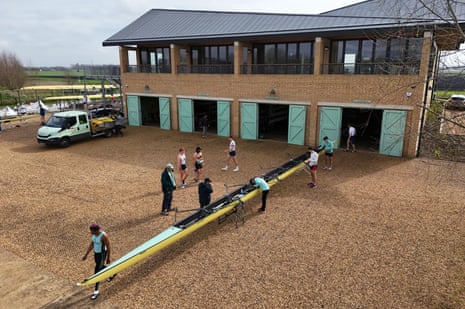
Top: The men’s blue boat prepare to derig their boat at their Ely training site. Above: The women’s blue boat put their vessel back in the boathouse after a training session on the Great Ouse.
But it’s not just the boathouse that has contributed so much, it’s also the stretch of water they train on. In a year when floods have affected so many parts of the country it has really come into its own. Paddy Ryan, the chief women’s coach, explains: “Along this stretch the river is actually higher than the surrounding land. The water levels are carefully managed by dikes and pumps. As a result we haven’t lost a single session to flooding. That’s not the case for Oxford. I believe their boathouse has been flooded multiple times this year, unable to get to their boats. We’ve had multiple storms but we’ve been able to row through them all.”
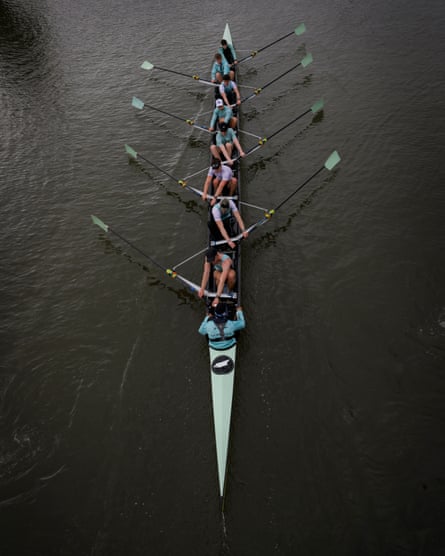
The men’s third boat practises on the Great Ouse.
It’s a flat, unforgiving landscape, especially in midwinter, definitely not the prettiest stretch of water, but Cambridge don’t care. Ryan says: “It might be a little dull on the viewing perspective but we could row on for 27km before needing to turn round. We have a 5km stretch that is marked out every 250m. We are lucky to have it.”
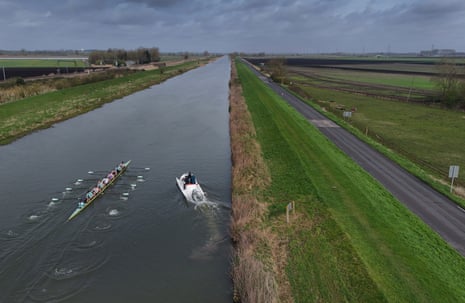
The men’s blue boat practise their starts on the long straight on the Great Ouse.

The sweat box
Members of the men’s squad check on their technique with the use of a mirror at the Goldie boathouse.
The old-fashioned Goldie boathouse is right in the centre of Cambridge perched on the banks of the River Cam. Built in 1873, its delicate exterior belies what goes on inside. This is the boat club’s pain cave, where the rowers sweat buckets, pushing themselves over and over again; it’s a good job the floor is rubberised and easy to wipe clean.
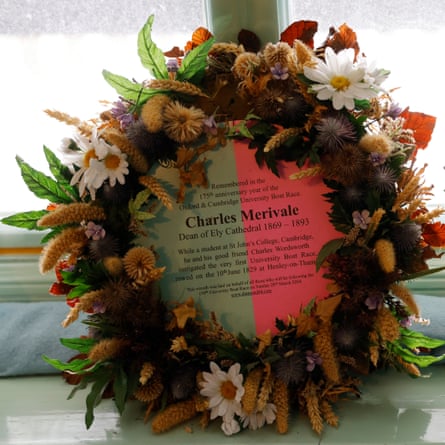
A wreath to Charles Merivale, the founder of the Boat Race, and wood panelling in the upstairs room at the Goldie boathouse which commemorates Cambridge crews that have competed in the Boat Race from 1829.

(Top) Seb Benzecry, men’s president of the Cambridge University Boat Club, and (above) Martin Amethier, a member of the reserve Goldie crew, sweat during sessions on ergo machines.

Iris Powell of the women’s blue boat (above) performs pull-ups during a training session.

Above left: Hannah Murphy, the cox of the women’s blue boat, urges on four of her crew (left to right) Gemma King, Megan Lee, Jenna Armstrong and Clare Hole, as they undertake a long session on the ergo machines. Above right: Kenny Coplan, a member of the men’s blue boat crew, looks exhausted then writes in his times after his session on an ergo machine (below).
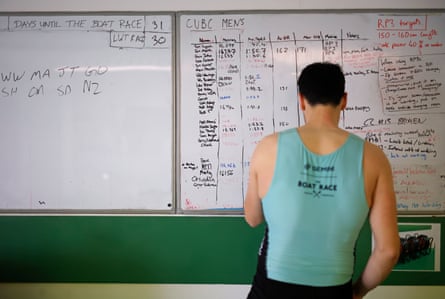
Brutal sessions on the various ergo machines, where thousands of metres are clocked and recorded, are a staple of the training regime set in place. If there is any slacking off the students just need to look up at one of the walls where a map of the Boat Race course hangs. The “S” shape of the Thames has been carefully coloured in the correct shade of blue and record timings for various key points on the course have been written in for both men and women. All but one record, and that one is shared, is held by Cambridge.

Paddy Ryan, the women’s chief coach, talks to the women’s blue boat during a training session on the River Great Ouse in February.
A key ingredient in any successful team is the coaching. Cambridge’s setup is stable and well established. Paddy Ryan is the chief women’s coach, a genial, tall Australian, he has been part of the women’s coaching team since 2013. The care and devotion to his squad is perfectly clear. “I have my notebook next to my bed so I can jot things down. I wake up in the middle of the night going: am I making the right decisions? I care about them as people and I need to manage them … We joke as coaches that we are teaching some of the smartest people on the planet how to pull on a stick.”
Rob Baker, the chief men’s coach, has Cambridge rowing in the blood. Born and bred in the city, his father was a university boatman for 25 years. He even married into the sport – his wife, Hayley, rowed for Cambridge as a lightweight – so it was no surprise that he became part of the coaching setup way back in 2001. He was the first full-time women’s coach in 2015 then moved to take over the men in 2018.
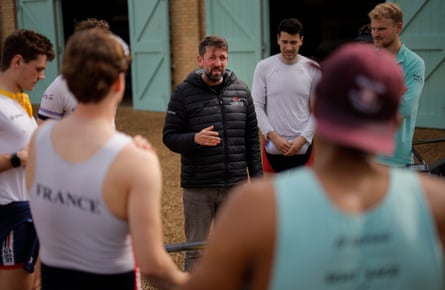
Rob Baker, the men’s chief coach, talks to his blue boat at their Ely training site.
Apart from an obvious role in the development of rowing skills, a key part of their job is making sure there is a balance for their student athletes. They understand they have to juggle training needs. “Every week we have a general plan,” says Baker, “but then someone might have an extra class or supervision they’ve got to do so we have to move around it. They are studying at one of the most competitive universities in the world with the highest standards so you’ve got to give them space to do that properly.” He goes on: “But when they get on the start line for their race, they’ll be just as competitive as if they were professionals.”
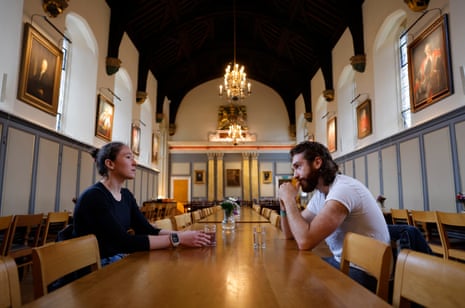
The presidents
Jenna Armstrong and Seb Benzecry discuss their plans in the Great Hall at Jesus College.
Every year one man and one woman are elected presidents to represent Cambridge University Boat Club. They are the captains and leaders, not only responsible for helping design the training programme in conjunction with the coaches but also making budgetary and tactical decisions along the way. This year both of them, Jenna Armstrong and Seb Benzecry, are from the same college, Jesus, which helps the communication between the two of them. They share ideas and knowledge, thoughts and worries. Their lives, for these intense few months, are a juggling act.
Armstrong is a 30-year-old from New Jersey, and doing a PhD in physiology. Once a very keen competitive junior skier she was forced to abandon her hopes of a career on the slopes after a number of serious knee injuries. She only started rowing in 2011 and only became aware of the Boat Race when she saw it on TV a couple of years later.
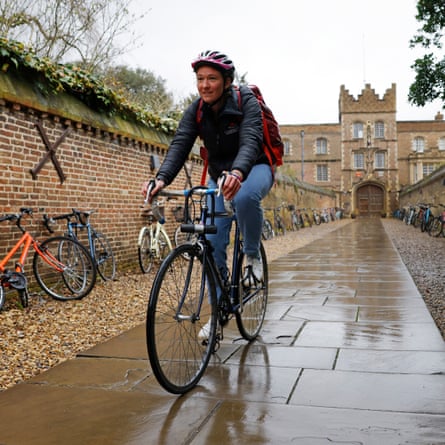
Jenna Armstrong, cycling down the Chimney, the grand entrance to Jesus College, to go to the other side of the city to carry out more of her PhD research at the department of physiology, development and neuroscience.
The research she carries out at the university labs could be turn out to be life-saving. “I study mitochondrial function in placentas from women from all over the world to learn how genetic and environmental factors during pregnancy can influence placental metabolism and impact the health of both mother and baby. I’m particularly interested in growth restriction which affects about 10% of babies worldwide. That can have lifelong implications for these babies and currently we don’t have any treatment for this.”
Benzecry, 27, is studying for a PhD in film and screen studies, and comes from a completely different rowing background. He grew up just a stone’s throw from the Boat Race course and went to a school on the banks of the Thames. This will be his 14th year of competitive rowing but his fourth and last Boat Race.
“ I remember one year my birthday fell on race day and we watched after my birthday party. Because we live fairly close to the course, I’ve always felt connected to the race.”

Seb Benzecry stands next to an Antony Gormley statue in the Quincentenary Library at Jesus College as he conducts research for his dissertation which forms part of his PhD in film and screen studies.
Talking about how hard it is to get the right balance between academic student life and rowing, Benzecry says: “I guess you have to accept there are many, many things you can’t do, you just don’t have time for during the season. You have to put the blinkers on.”
Armstrong says: “I have to be very prepared, very strategic and organised. I pack everything the night before, and then once I leave my room in the morning, I don’t go back. That allows me to go to training, go to the lab, go to training again. It’s surreal actually, to come to a place like Cambridge, have one of the best educations in the world on top of the most incredible rowing experiences in the world. We have a thing now in the boat, when we are doing something incredibly hard, I say this is my ideal Saturday, I wouldn’t want to be anywhere else. I would rather be here than in bed or on a date. And I make everyone else say it with me too. I’d rather be nowhere else.”
Benzecry states: “When it’s really bad, when training is so hard, we say Oxford aren’t doing this, they could never do this. It’s an incredibly powerful thing to be thinking we work harder than them, our culture is better than them. They don’t want to go hard as we do – they might think they do but they don’t, they just don’t have it.”
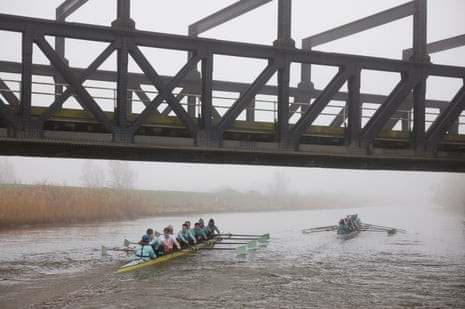
Integration
The men’s and women’s blue boats during a training session on the River Great Ouse in February.
Until 1 August 2020, there were three separate university boat clubs in Cambridge: one for open-weight men, one for lightweight men, and one for open-weight and lightweight women. Since they merged to become one club, it has undoubtedly helped with everyone sharing the same resources and motivating and inspiring one another. No one is more important and everyone has a key part to play in the result. This year, Oxford have followed suit.
Baker says: “I definitely feel, for the athletes themselves, it makes a big difference. They all feel like they’re contributing to one common goal. Every cog in the wheel has to do its job but for sure it feels like one big team on a mission.”
Benzecry explains: “We’re seeing each other train, we’re all out on the water at the same time, we’re supporting each other throughout the season, building a sense of momentum for the whole club towards the races. Everyone’s just inspiring each other all the time and I think that’s been such a sort of cultural shift for Cambridge.”
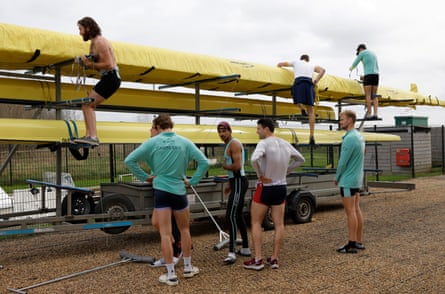
The men’s blue boat pack their craft on to a trailer at their Ely training site ready for the trip down to London for the Boat Race.
Siobhan Cassidy, the chair of the Boat Race, knows from first-hand how the integration has helped. She rowed for the Light Blues in 1995 and had a key role in the transition. “We could see the advantages of working together, collaborating as a bigger team, the positive impact we felt that could have on performance. But not just the output, actually the whole experience for the young people taking part.”
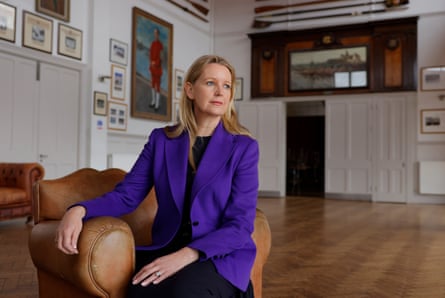
Siobhan Cassidy, the chair of the Boat Race, pictured at the Thames Rowing Club at Putney Embankment.
This Saturday, if the weather holds, an estimated 250,000 people, the vast majority of whom have no allegiance to one shade of blue or the other, will pack the banks of the Thames to see these races. It’s one of the largest free events in Britain. Broadcast live on BBC One, the race is also beamed to 200 countries across the world.
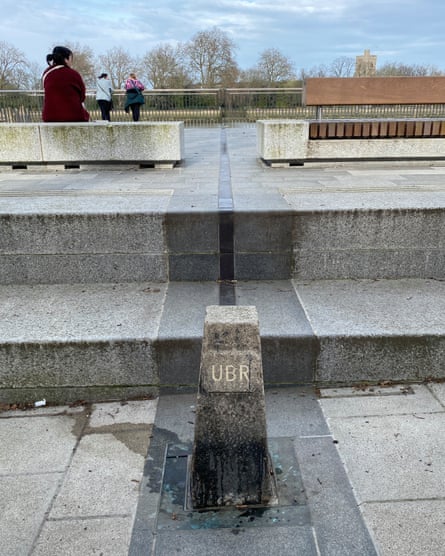
The starting stone for the University Boat Race and pavement inscription: “The best leveller is the river we have in common” at Putney Embankment.
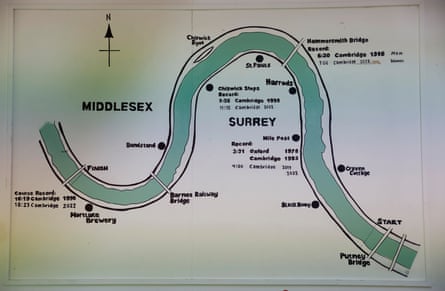
A map of the Boat Race course at the Goldie boathouse, with the Thames coloured in Cambridge blue and record timings written in for men and women showing almost total Cambridge dominance.
A sporting pinnacle being contested on a fast-flowing, unpredictable river by two teams of university students – it’s pretty bizarre. But maybe it’s that quirkiness that keeps the race, after almost two hundred years, still going strong. And even more bizarre to think that Cambridge, the current dominant force in the Boat Race, a sporting event that can’t shrug off its elitist stereotype, owes so much of that success to such egalitarian principles.
- The Guardian picture essay
- The Boat Race
- University of Cambridge
- Photography
Most viewed
News | Holberg Laureate to deliver annual lecture on ‘colonialism and its legacies’ at Oriel College
Holberg Laureate to deliver annual lecture on ‘colonialism and its legacies’ at Oriel College
Oriel College, University of Oxford, announces 2019 Holberg Laureate Paul Gilroy, Professor of Humanities at University College London, as the speaker for the 2024 Rex Nettleford Lecture.
Professor Paul Gilroy, Founding Director of the Sarah Parker Remond Centre for the Study of Racism and Racialisation at University College London, will give the 2024 Rex Nettleford Lecture on Colonialism and its Legacies at Oriel College, Oxford.
It is the third year Oriel College has held a lecture named in honour of the late Rex Nettleford, an alumnus of the College and Vice-Chancellor Emeritus of the University of the West Indies. The lectures aim to contribute to the advancement of academic research into the legacies of colonialism in all its forms.
One of the foremost theorists of race and racism working and teaching in the world today, Gilroy was awarded the Holberg Prize “for his contributions to critical race studies, post-colonialism and related fields” in 2019. His lecture at Oriel College will be on “The Evolving Political Significance of Studying Africa’s Diaspora.”
After Gilroy’s lecture, there will be a prize ceremony for winners of the annual Rex Nettleford Essay Prize . Each year, the competition invites year 12 students at UK schools or colleges to submit essays on the enduring influence of colonialism and uncomfortable questions posed by it.
The 2024 Rex Nettleford Lecture will take place in the Harris Lecture Theatre, Oriel College, Oxford, from 5.30 to 6.30 pm on Thursday 16 May. The event is free to attend, and everyone is welcome, though it is recommended attendees register in advance .
1980–83 Gaudy and Adam de Brome lunch 2024
Eight oriel rowers selected for 2024 oxford and cambridge boat race, oriel college’s english fellow researches how american novelists reacted to trump’s 2016 election.
- Student Legal Writing Competitions - June 2024
- March 27, 2024
- Announcements
The following are writing competitions to which law students may be eligible to submit their writings. For future writing competition deadlines and competitions by subject, see the Library’s Student Legal Writing Competitions Guide .
Cornelius Vander Broek Essay Contest for Ongoing College Students The Freedom From Religion Foundation offers five 2024 essay competitions for freethinking students — awarding more than $65,000 in total scholarships. Check the link for current topics and deadlines.
National Sports Law Student Writing Competition The goal of the National Sports Law Student Writing Competition is to encourage law student scholarship on current topics in sports law. Check the link for updated topics and deadlines.
A More Perfect Union - Chicago-Kent Annual Racial Justice Writing Competition As pledged in the 2020 Faculty Antiracism Statement, Chicago-Kent College of Law presents the second annual writing competition to encourage and honor excellent student scholarship on racial justice. The Law Library is excited to be the new sponsor of this writing competition.
Adam A. Milani Disability Law Writing Competition The purposes of the competition are to promote greater interest in and understanding of the field of disability law and to encourage excellent legal writing skills in law students.
American Bar Association James B. Boskey Law Student Essay Contest on Dispute Resolution The essay may address any aspect of dispute resolution practice, theory, or research that the contestant chooses.
H. Thomas Austern Writing Competition "intended to encourage law students interested in the areas of law affecting FDA-regulated industries: food, drugs, medical devices, biologics, dietary supplements, cosmetics, veterinary, cannabis, or tobacco and nicotine products."
Tax Notes Student Writing Competition "Our annual student writing competition recognizes superior student writing on unsettled questions in tax law or policy."
College of Labor and Employment Lawyers and ABA Section of Labor & Employment Lawyers "Current and relevant topics of labor and employment law."
ChapmanAlbin Scholarship for Law Students "Since 2015, ChapmanAlbin has sponsored a yearly $1000 scholarship for incoming and current law students. To apply, a U.S. law student must write a 300-500 word essay on a specific topic and meet a few other criteria for consideration."
Funk & Associates Annual Scholarship $1000 scholarship. "The original essay should be 500-1000 words and should describe how you plan on helping others with your legal career."
American Intellectual Property Law Association Robert C. Watson Award "Law students are encouraged to submit an article on an IP topic, written on or before June."
American Association of Patent Judges (AAPJ) Hon. Frederick E. McKelvey Writing Competition "Candidates shall submit essays concerning any subject relating to U.S. patent law. The first-place essay will be published in the Journal of the Patent and Trademark Office Society (JPTOS) (subject to editorial discretion and review, as explained below) and the author will receive an award and $1,000. The author of the runner-up essay will receive an award and $500." [2024 Information Forthcoming - Check AAPJ website.]
American College of Trust and Estate Counsel Mary Moers Wenig Student Writing Competition "Consistent with ACTEC’s purposes, the American College of Trust and Estate Counsel Mary Moers Wenig Student Writing Competition was created to encourage and reward scholarly works in the area of trusts and estates."
American Society for Pharmacy Law (ASPL) Larry M. Simonsmeier Writing Award "ASPL recognizes outstanding scholarship related to Pharmacy Law with the Simonsmeier Award."
Gellhorn-Sargentich Law Student Essay Competition "Any topic relating to administrative law."
American College of Employee Benefits Counsel Writing Compeition Prize Papers may be on any topic in the employee benefits field.
- Academic and Student Programs
- Career Services and Internships/Externships
- General Announcements
- Student Organizations
- Student Services and Administrative Offices
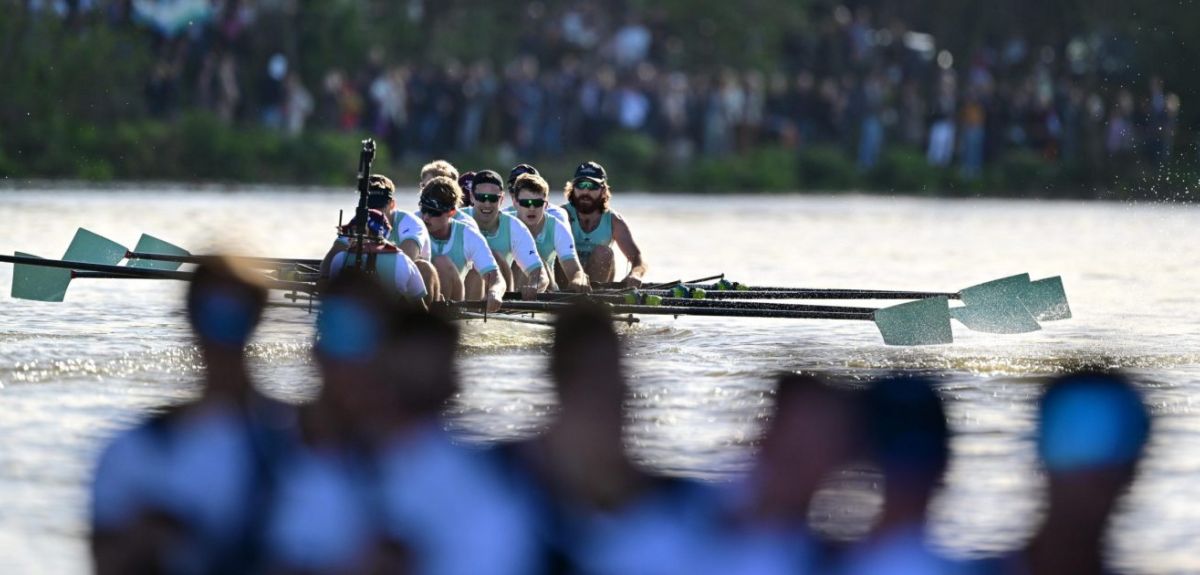
Cambridge claim victory in the 2024 Boat Race
Cambridge celebrated a double success in the 2024 Boat Race, winning both the Men's and Women's races.
The Boat Race- one of the world’s oldest and most famous amateur sporting events- is an annual event between crews from the University of Oxford and the University of Cambridge. This year, in the 169th Men’s Boat Race, Cambridge made a rapid start that allowed them to open up a lead of more than 10 seconds. Although they slowed towards the end- with rower Matt Edge clearly struggling- the team ultimately held on for a comfortable victory. Cambridge were also victorious in the men's reserve crew race.
In the 77 th Women’s Boat Race, Oxford made a flying start but were overtaken after about 10 minutes and could not recover. However, the Oxford team, called Osiris, triumphed in the women's reserve crew race.
The University of Oxford’s Vice-Chancellor, Professor Irene Tracey CBE FRS FMedSci, said: 'I’m so proud of all our Oxford crews for their determination, grit and performance today. Not the results we wanted but congratulations do go to Osiris who were victorious, and of course to Cambridge on their impressive wins. Thanks go to the coaches and support teams as well as the supporters who turned up in droves - next year!'
The Boat Race took place on The Championship Course on the River Thames in South West London. The approximately 4.25 mile course, first used in 1845, stretches from Putney to Mortlake. The average time taken to complete the course is 20 minutes, but the Cambridge men's crew holds the record for the fastest time of 16 minutes and 19 seconds, achieved in 1998.
The Boat race is held in March or early April, after the captain of the previous year's losing team issues a formal challenge. The Men’s Boat Race was first raced in 1829 and the Women’s Boat Race first took place in 1927. Typically, the event attracts over 250,00 spectators, with many millions more watching on television.
After this year’s results, Cambridge now have 48-30 and 87-81 leads in the women’s and men’s races respectively.
Previous Men’s Boat Race and Women’s Boat Race results can be found on the Boat Race website.
DISCOVER MORE
- Support Oxford's research
- Partner with Oxford on research
- Study at Oxford
- Research jobs at Oxford
You can view all news or browse by category
Earth Day Events Planned at Scranton

In recognition of Pope Francis’s call toward environmental sustainability, The University of Scranton’s Sustainability Office chose “Sustainable Living, Caring for Creation” as the theme for this spring’s Earth Day celebration, which includes nearly a dozen events, many of which are open to the public, free of charge.
The theme is inspired by Pope Francis’ 2015 encyclical letter “Laudato Si’: On Care for Our Common Home” and The University of Scranton’s commitment to join a coalition of colleges from around the world to develop, implement and evaluate initiatives around seven ecological goals over a seven-year period to meet the Pope’s call for integral ecology and to gain designation by the Vatican as a Laudato Si’ University .
This year’s Earth Day Essay Contest, open to area students in grades 5-12, has the same theme: “Sustainable Living, Caring for Creation.” Submissions will be accepted until April 5, and winners will be announced at the Evening of Environmental Science event on April 18. For more details on the essay contest, visit the contest webpage .
The exhibit in the University’s Hope Horn Art Gallery, titled “Our Common Home, University Art Collection,” will highlight 20 th and 21 st century portrayals of scenes and nature associated with eastern Pennsylvania. The exhibit opens April 5, with a Curator’s Lecture in the Pearn Auditorium of Brennan Hall from 5 p.m. to 6 p.m., followed by an opening reception in the Hope Horn Gallery in Hyland Hall from 6 p.m. to 8 p.m. The exhibit will be on display during gallery hours through May 3. The lecture, reception and exhibit are open to the public, free of charge.
The Weinberg Memorial Library will host an Environmental Art Show featuring art of members of the University community in the Charles Kratz Scranton Heritage Room from April 15 to April 24. A lecture by artist Theresa O’Connor on April 15 at 5 p.m. will open exhibit, that can be seen, free of charge, during library hours.
The University will host an Earth Day Fair on April 16, from 11 a.m. to 1 p.m. in the Atrium of the Loyola Science Center. The event will feature University student displays as well as, displays from university departments, local non-profits and governmental offices, which will provide information about sustainable practices and products.
The Evening of Environmental Science, set for April 18, from 5:30 p.m. to 7 p.m. in the Atrium of the Loyola Science Center, will feature a display of essays received for the Earth Day Essay Contest, as well interactive environmental displays and activities. Awards for the Earth Day Essay Contest will be presented at the event. The Earth Day Fair and the Evening of Environmental Science are open to the public, free of charge.
For members of the University community, the University will host a day-long Environmental Teach-In, which focuses on topics of environmental sustainability, on April 23, beginning at 8:30 a.m. in the Loyola Science Center. Earth Day celebrations conclude with a kayaking trip on the Susquehanna River for students on May 5, hosted by the University’s Sustainability Office and the Society for Sustainability and Conservation.
Related Earth Day events that were held on campus prior to the month of April, included a World Water Day event at the DeNaples Center on March 21 that featured interactive activities and displays to help raise awareness of water usage and its importance. From Feb. 19 to 23 the Fresh Food Company held Plant Based Meals Week for University students. Also, on March 5, the film “The Letter: Laudato Si, A Message for our Earth” was screened at the Moskovitz Theater of the DeNaples Center.
Visit The University of Scranton’s sustainability webpage for information about the University’s sustainability efforts and Earth Day events , or call the Office of Sustainability at 570-941-6267.


Study at Cambridge
About the university, research at cambridge.
- Undergraduate courses
- Events and open days
- Fees and finance
- Postgraduate courses
- How to apply
- Postgraduate events
- Fees and funding
International students
- Continuing education
- Executive and professional education
- Courses in education
- How the University and Colleges work
- Term dates and calendars
- Visiting the University
- Annual reports
- Equality and diversity
- A global university
- Public engagement
- Give to Cambridge
- For Cambridge students
- For our researchers
- Business and enterprise
- Colleges & departments
- Email & phone search
- Museums & collections
- Undergraduate Study
- Student life overview
- Why Cambridge
- Accommodation
- Sport and societies
- Courses overview
- Choosing a course
- How you will learn
- Careers and graduate prospects
- Subject A-Z
- Colleges overview
- What is a College?
- Choosing a College
- College contacts
- Area links scheme
- Finance overview
- Tuition fees
- Living costs
- Financial support
- Music awards
- Applying overview
- Application timeline
- Before you apply
- After you apply
- International overview
- Chat with our students
- Why Cambridge?
- What can I study?
- Entry requirements
- Tuition fees and costs
- International visits and events
- Visas and immigration
- Year abroad
- Get in touch!
- Open Days and Events overview
- Upcoming events
- Cambridge Open Days
- Virtual Tour
- Think Cambridge
- Applicant Webinar Series
- Subject Masterclasses
- Teachers and advisers' events
- HE fairs and exhibitions
- Find out more overview
- Sign up to our Newsletter
- Widening participation
Parents and supporters
Teachers and advisers
- Getting here
- Why Cambridge overview
- Study facilities and libraries
- Cambridge explained
- Support overview
- College welfare
Disabled students
Mature students
- Counselling
- Care leavers overview
- Realise student snapshot
- Travel Fund
- Young carers
- Student parents and childcare
- Estranged students
- Area links scheme overview
- East Midlands overview
- Leicester City
- Leicestershire
- Lincolnshire
- Northamptonshire
- Nottinghamshire
- East of England overview
- Bedfordshire
- Cambridgeshire
- Hertfordshire
- Peterborough
- Southend-on-Sea
- Greater London overview
- Barking and Dagenham
- City of London
- City of Westminster
- Hammersmith and Fulham
- Kensington and Chelsea
- Tower Hamlets
- Waltham Forest
- North East overview
- Middlesbrough
- North Tyneside
- Northumberland
- Redcar and Cleveland
- South Tyneside
- Stockton-on-Tees
- North West overview
- Blackburn with Darwen
- Telford and Wrekin
- Northern Ireland
- South East overview
- Bracknell Forest
- Milton Keynes
- Oxfordshire
- Southampton
- Isle of Wight
- Buckinghamshire
- West Berkshire
- South West overview
- Bath and North East Somerset
- Bournemouth
- Gloucestershire
- North Somerset
- South Gloucestershire
- Wales overview
- North Wales
- Mid and South Wales
- West Midlands overview
- Herefordshire
- Staffordshire
- Warwickshire
- Wolverhampton
- Worcestershire
- Yorkshire and Humber overview
- East Yorkshire
- Huddersfield and Kirklees
- Kingston-upon-Hull
- North East Lincolnshire
- North Lincolnshire
- North Yorkshire
- Isle of Man
- Living costs overview
- Study costs
- Financial support overview
- Cambridge financial support
- Government financial support
- Family contribution
- Outreach Scholarships overview
- Stormzy Scholarship
- Formula 1 Scholarship
- Geography Scholarship
- Student Funding and Sharia Law
- Music awards overview
- Choral awards overview
- Instrumental awards overview
- Organ scholarships overview
- College vacancies and course restrictions
- When are the auditions and interviews?
- What do the Organ Trials involve?
- How do I apply?
- Further information
- Choosing high school subjects
- Improve your application
- Entry requirements overview
- Qualifications we accept
- Sixth Term Exam (STEP)
- International entry requirements
- Application statistics
- Mature student applications
- Second undergraduate degrees
- UCAS application
- Admission tests overview
- Clinical aptitude test (UCAT)
- Law test (LNAT)
- Engineering and Science test (ESAT)
- Mathematics test (TMUA)
- College admission assessments
- My Cambridge Application
- Disruption to your studies
- Written work and portfolios
- Cambridge interviews overview
- Prepare for an interview
- Application decisions overview
- Admissions Policy
- Unspent criminal convictions
- Contextual data
- Outcome of your application overview
- Terms of Admission
- Admissions complaints
- After you get your exam results overview
- Information for new students
- Applying for reconsideration overview
- Reconsideration eligibility criteria
- Tuition fees and costs overview
- International financial support
- Tuition fee status
- International visits and events overview
- International webinar series
- Teachers and advisers' events overview
- Teachers and Advisers' Webinars
- Teachers and Advisers' Conference
- Widening participation overview
- Access and Participation Plans
- Insight Discover
- Insight Explore
- Sutton Trust Summer Schools
- Apply: Cambridge
- Safeguarding
- Parents and supporters overview
- Parents' Newsletter
- Teachers and advisers overview
- How similar are Oxford and Cambridge?
- Helping students prepare
- School/college reference
- Teachers' Newsletter
- Events for Teachers and Advisers
- Inspiring Educator Awards
Fitzwilliam College Essay Competitions 2024
- Open Days and Events
- Student life
- International
- Find out more

This year we will be running essay competitions in Ancient World and Classics, Archaeology, Economics, History, Land Economy, Medieval World and Slavonic Studies. We will additionally be running an Architecture design competition. Further particulars and this year's questions can be found on our Essay Competitions webpage.
Date and time
Contact and more info, cambridge admissions office.
- Cambridge Admissions Office Student Services Centre New Museums Site Cambridge CB2 3PT
- 01223 333308
- [email protected]
- www.cao.cam.ac.uk
About this site
Our website
Privacy policy
Participant data and booking policies
Information for
Care leavers and estranged students
© 2024 University of Cambridge
- Contact the University
- Accessibility
- Freedom of information
- Privacy policy and cookies
- Statement on Modern Slavery
- Terms and conditions
- University A-Z
- Undergraduate
- Postgraduate
- Research news
- About research at Cambridge
- Spotlight on...

COMMENTS
Discourse, debate, and analysis Cambridge Re:think Essay Competition 2024 Competition Opens: 15th January, 2024 Essay Submission Deadline: 10th May, 2024 Result Announcement: 20th June, 2024 Award Ceremony and Dinner at the University of Cambridge: 30th July, 2024 We welcome talented high school students from diverse educational settings worldwide to contribute their unique perspectives to […]
Important Dates & Deadlines . Competition Opens: Jan 15, 2024 Essay Submission Deadline: 10th May, 2024 Result Announcement: 20th June, 2024 Award Ceremony and Dinner* at the University of Cambridge: 30th July, 2024 *Only shortlisted students (awarded Honourable Mention or above) and their companies are invited to the ceremony and dinner.
If you require any information provided on this website in an alternative format, please contact us on 01223 338400 or email [email protected]. The R.A. Butler Prize for essays in Politics and International Studies is a competition that can be entered by students in Year 12 or the Lower 6th. Candidates.
If you require any information provided on this website in an alternative format, please contact us on 01223 338400 or email [email protected]. The following pages contain information about our Essay Prizes run for Lower and Upper 6th Students internationally, including how to apply. The Robson History.
All essay competitions and events at Cambridge (both online and in-person) can be found here 🔗 🌟. Magdalene College Arts and Humanities Essay Competition 2024 🔗 🌟 Any student in their penultimate year at a state school can enter this competition, which will open in early 2024. Last year, there were 12 questions covering a variety of ...
Fitzwilliam College is delighted to announce its 2023 Essay competitions. This year there will be essay competitions in Ancient World and Classics, Archaeology, History, Land Economy, and Medieval World. We will additionally be running an Architecture design competition, and a new essay competition in Economics for state-schooled UK students only.
The essay questions cover the breadth of arts and humanities subjects offered at undergraduate level at the University of Cambridge. Questions are often multi-disciplinary, designed to encourage entries to consider the connections between various subjects, and to allow entries to approach the question from varying angles.
This essay competition is for students in year 21 or equivalent; limit of 2500 words. 2022 brief: Fitzwilliam College traces its origins to 1869, when the University of Cambridge launched an initiative to facilitate access to Higher Education for the many students who could not afford the costs of college membership.
Each year, Fitzwilliam College runs essay competitions in a variety of subjects, allowing talented pupils to explore their interests beyond the school curriculum. The University of Cambridge seeks out students with a passion for their subject and who have investigated it outside the classroom. Our essay competitions provide students with an ...
Woolf Essay Prize 2024. The Woolf Essay Prize 2024 is now open! Woolf Essay Prize 2024 Information and Questions. In 1928, Virginia Woolf addressed the Newnham Arts Society on the Subject of 'Women and Fiction', and from this talk emerged her seminal text, A Room of One's Own.Newnham is very proud of its place in the history of women's education, and we are delighted in the ...
Trinity College launched the Gould Prize for Essays in English Literature in 2013. This is an annual competition for Year 12 or Lower 6th students. The Prize has been established from a bequest made by Dr Dennis Gould in 2004 for the furtherance of education in English Literature. This Essay Prize has the following aims.
The Kelvin Biological Sciences Essay Competition is open to students in their penultimate year of study (Year 12 in England and Wales, S5 in Scotland, Year 13 in Northern Ireland, or equivalent) who are educated in the United Kingdom and Ireland. Please make sure that you have read the submission guidelines and FAQs sections carefully before ...
We have gathered together some of the key essay competitions to enter, hosted by colleges at Oxford and Cambridge University. If you are applying for Oxbridge or a top UK or Russell Group university that interviews its applicants, it is worth noting that many of the competition questions are very similar to interview-style questions.
Winners attending the 2022 Prize-Giving Ceremony. Find details about how to get in touch on our contact page. If you require any information provided on this website in an alternative format, please contact us on 01223 338400 or email [email protected]. This annual Essay Competition aims to raise awareness of the systematic study of ...
Cambridge University Press is the publishing business of the University of Cambridge. Granted letters patent by Henry VIII in 1534, it is the world's oldest publishing house and the second-largest university press in the world. Cambridge University Press has been a sponsor of The Queen's Commonwealth Essay Competition since 2013. www ...
The Kelvin Science Essay Competition is open to students in their penultimate year of study (Year 12 in England and Wales, S5 in Scotland, Year 13 in Northern Ireland, or equivalent) who are educated in the United Kingdom and Ireland. Submissions will close on Monday 24th April at 23:59 pm GMT . For more information and to participate, please ...
We are delighted to announce that the winner of the 2023 Marshall Society Essay Competition is David Lu of Raffles Institution, Singapore. David's essay in response to Question 4 deftly balanced advanced economic theories with real-world data, clear explanations, and rhetorical flair, and was a pleasure to read.
The deadline for essay submission is the 26th July, 12 Noon. Please send your essay as well as a completed Entry Form (including your full name, school address and email address) to [email protected] with the email subject 'Submission for Essay Competition 2023'. We aim to decide on a winner by the end of August.
The Immerse Education Essay Competition provides the opportunity for students aged 13-18 to submit essay responses to a pre-set question relating to their chosen subject. Register interest to receive your guide with the comprehensive list of questions including: - Essay Specifications. - Top Tips for Writing an Academic Essay.
Academic conference: 20 - 22 September, 2024. Awards dinner: 21 September, 2024. Contact. Any queries regarding the essay competition should be sent to [email protected]. Please be aware that, due to the large volume of correspondence we receive, we cannot guarantee to answer every query.
Our photographer has been spending time with the Cambridge University Boat Club over the past few months as they prepare for 2024's races by Tom Jenkins Fri 29 Mar 2024 08.08 EDT Last modified ...
The Armstrong Arts and Humanities Essay Competition is open to students attending state-maintained schools in the UK, and who are in their penultimate year of education (Year 12 in England and Wales, S5 in Scotland, or Year 13 in Northern Ireland). The essay questions cover the breadth of arts and humanities subjects offered at undergraduate level at the University of
Oriel College, University of Oxford, announces 2019 Holberg Laureate Paul Gilroy, Professor of Humanities at University College London, as the speaker for the 2024 Rex Nettleford Lecture ... there will be a prize ceremony for winners of the annual Rex Nettleford Essay Prize. Each year, the competition invites year 12 students at UK schools or ...
Cornelius Vander Broek Essay Contest for Ongoing College Students The Freedom From Religion Foundation offers five 2024 essay competitions for freethinking students — awarding more than $65,000 in total scholarships. Check the link for current topics and deadlines. National Sports Law Student Writing Competition
Cambridge claim victory in the 2024 Boat Race. Sport University. Cambridge celebrated a double success in the 2024 Boat Race, winning both the Men's and Women's races. The Boat Race- one of the world's oldest and most famous amateur sporting events- is an annual event between crews from the University of Oxford and the University of Cambridge.
The competition is open to students attending state-maintained schools in the UK, and who are in their penultimate year of education (Year 12 in England and Wales, S5 in Scotland, or Year 13 in Northern Ireland). The essay questions cover the breadth of arts and humanities subjects offered at undergraduate level at the University of Cambridge.
This year's Earth Day Essay Contest, open to area students in grades 5-12, has the same theme: "Sustainable Living, Caring for Creation.". Submissions will be accepted until April 5, and winners will be announced at the Evening of Environmental Science event on April 18. For more details on the essay contest, visit the contest webpage.
Fitzwilliam College Essay Competitions 2024. This year we will be running essay competitions in Ancient World and Classics, Archaeology, Economics, History, Land Economy, Medieval World and Slavonic Studies. We will additionally be running an Architecture design competition. Further particulars and this year's questions can be found on our ...